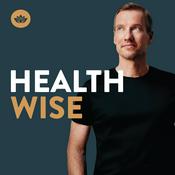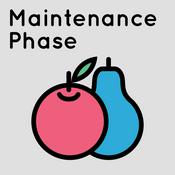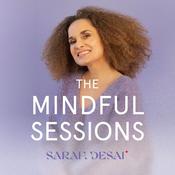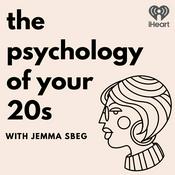241 Episoden
- You're listening to Burnt Toast! We are Virginia Sole-Smith and Corinne Fay.
Today our conversation is with Kim Baldwin, the newest member of the Burnt Toast team.
Kim is the former digital editor for the Nashville Scene. Her culture writing can be found in places like the Nashville Scene, Parnassus Books’ Musings and on her Substack. Kim has interviewed folks like Sarah Sherman, Trixie Mattel, John Waters, Samantha Irby and Tess Holliday.
Originally a blogger, Kim started The Blonde Mule in 2006 and later turned her popular interview series “These My Bitches” into a podcast called Ladyland. Kim writes a weekly newsletter about books and pop culture, teaches social media classes and is a frequent conversation partner for author events in Nashville.
If you enjoy this conversation, a paid subscription is the best way to support our work!
Join Burnt Toast
🧈🧈🧈🧈🧈🧈🧈🧈🧈🧈🧈🧈🧈🧈
Episode 233 Transcript
Virginia
We have a very fun episode for you today. We are introducing to all the Burnt Toasties, many of whom may already know and love her, our new podcast producer Kim Baldwin.
Kim
Hi, hi, hi.
Virginia
We are really happy you're here. Kim is doing a lot of things to improve our workflow. Yesterday she taught Corinne and me how to use Slack. Corinne, I think you already knew how to use Slack, but I sure did not. So that was exciting.
Kim is joining us not just to teach us Slack, but to help with podcast production and make everything run more smoothly and efficiently. We are really grateful to her and thought it would be fun to do an episode where you get to know her.
Kim
I'm excited to be on the Burnt Toast team, and excited to be here today despite harrowing conditions.
Virginia
Truly harrowing.
Kim
I'm coming to you live from a public library because my home does not have water or internet.
Virginia
Yes, Kim is surviving the Nashville ice apocalypse, where, what 130,000 people have been displaced?
Kim
230,000.
Virginia
230,000 people have been displaced. So she has been heroically working on
Burnt Toast while literally being out of her home, back in her home, but now working from the library. Yay, public libraries! We love you.
Let's dive in. Corinne, why don't we take turns asking our questions?
Corinne
My first question is, what is your fat radicalization story? How did you get interested in body liberation work?
Kim
When I turned 40 I had to get a biometric screening for health insurance because over 40, you have to qualify for insurance. It was a really stigmatizing appointment. In hindsight, it was traumatic. My therapist was like, Enough. You have to go see someone now.
That was 2018. I started working with an anti-diet registered dietitian. I thought I was going for one or two appointments, just for someone to say, "It's fine, you're all good." It became evident I had a disordered relationship, primarily with exercise, but also with eating. I went into what I now call recovery. It wasn't called that in real-time. It was just a chill, "Well, why don't you come see me every week for a while?"
So I did that. I worked with Katherine Fowler, a non-diet, registered dietitian nutritionist here in Nashville. She's great. I knew nothing before her. She introduced me to anti-diet and Health at Every Size. She gave me a bunch of resources, one of which was Christy Harrison and Food Psych. I went whole hog. I listened to the back catalog of Food Psych, I read a bunch of books. I think Christy's first book came out around that time. It was so radical to me to think, Hold on, I can be fat, or, Hold on, I don't have to exercise this much. I was an Iron Man, so I was at that level of exercise.
Virginia
Oh wow. Oh gosh, that's aggressive.
Kim
When you exercise that much, for me, restrictive eating is just part of it. They really do go hand in hand. You control your food to try to control your outcomes and races and stuff.
That's a long answer: back in 2018 I started working with registered dietitian, and she blew my mind and saved my life.
Virginia
That's amazing. Yay, registered dietitians who do that work! Also, yay, Food Psych! That was a great podcast. Corinne, wasn't it one of your entry points, too? I feel like we've talked about this.
Corinne
Yeah. I was a regular listener.
Virginia
Just hearing people's stories over and over. The way Christy structured that was so healing and valuable for so many people.
I've always been a fan of your culture writing. You always have amazing book recs, movie recs. Your newsletter The Blonde Mule is definitely one of my go to's for like, Ooh, what culture am I missing out on? Kim will know. So I would love to know who are some of your fat culture inspirations, icons, or just people you really love in that space?
Kim
For sure Aubrey Gordon. She was an original, and back then, she was anonymous. Her Instagram posts back in the day - she still sometimes reposts those old ones in her stories. She still means so much to me. I learned about her early on.
And then, of course, Lindy West. I had read Shrill, and because I worked at an alt-weekly, she also worked at The Stranger in Seattle, which is their alt-weekly, and we had similar jobs, so I looked up to her. She had this great essay in The Stranger where she came out as fat. In real time, I wasn't there yet, but when I got into recovery and started learning, I realized how ahead of her time - ahead of all of us - she was.
And then, Virginia, you and people I found through Food Psych and through Christy. Back then we were all still using social media with wild abandon. You could learn about people through Instagram stories. Christy Harrison would repost all these people to her Instagram stories and I would click through and follow who she reposted. She'd repost something of yours, or, I can't even remember all the people back then. Oh, Ragen Chastain. I've been reading her stuff this whole time. I hope everyone reads her and knows what amazing work she's doing in this space. I can't get a sense of how many people know how much she's doing.
Virginia
She does such deep dives into the research. She really is someone who is taking the time to take apart scientific papers, look at the methodology, look a what bias went into the research. I have learned so much from Ragen. I started following her back in probably the early 2000s when she was writing about being a fat dancer. I remember I interviewed her for a woman's magazine.
Kim
Oh right. I forgot about that, her original handle.
Virginia
Dances With Fat. Oh, you're making me nostalgic for this time. Now everyone's like, Body positivity is dead, and it was never really good, but there were these really good folks doing great work in the mix.
Kim
There was an organic way to find, I don't want to say community in the way we say it now, but I didn't know anybody in real life going through what I was going through, or who was learning what I was learning. All I had, truly, was Food Psych. So if someone was on Food Psych, I would look them up. I would follow them. And then that reposting thing, that's how I found so many people.
Virginia
Yeah, it's so true.
Corinne
Kim, where does the name The Blonde Mule come from?
Kim
Oh, this question.
Corinne
If you want to skip it ...
Kim
It brings up a lot of embarrassment. I should address it.
Virginia
It's time. Kim, it's time. I don't know the backstory.
Kim
In 2006 I started a personal blog on blogspot because everyone was doing it. Back then it was the thing to have a cutesy name. No one used their government name online back then. Your email wasn't your name, your blog - none of that was your name. I'm a Taurus and I am actually stubborn, so "the mule" was kind of a nickname. There was this formula of a physical descriptor plus a nickname. All my friends had a version of this. I thought, Oh, I'll just do the blonde mule. I'll change it later, nobody cares. No one followed me.
Then I had to buy my domain name and get handles on social media sites. So 2006 to 2026, how many years is that? Is that 20 years? So unfortunately, I'm locked in. Because now I own that name. I don't love it because I wish I hadn't self identified with my hair color. Especially because it's blonde and that means a lot of things that don't align with my values. Also, during the pandemic, I quit coloring my hair and so I'm not really blonde anymore.
Virginia
A blonde-ish mule.
Corinne
I would consider you blonde.
Virginia
I still would consider you blonde.
Corinne
Also Virginia, aren't you also a Taurus?
Virginia
I am also a Taurus. I am also pretty stubborn.
Corinne
This is an earth sign podcast. I'm a Capricorn.
Kim
John, my husband, is a Capricorn.
Virginia
I don't know what that means.
Kim
We're very compatible.
Corinne
Yes, I also have a Taurus Moon.
Virginia
Sure. I've been meaning to get one of those. I don't understand astrology.
But I do relate to picking a name and sticking with it because now you're stuck with it. In many ways that is the backstory of Burnt Toast. So relatable. I named it on a whim. People are always like, What's that about? And I'm like, I mean, not a lot. But it is what it is.
The Blonde Mule is sticky. It sticks with you.
Kim
There are people who make me feel better. One is Samantha Irby because she is still bitches gotta eat. She also is from, like, 2006. There are a few of us that are locked in. What are you going to do? I literally bought this name.
Virginia
I'm stuck with it. You might as well own it, for sure.
Another part of your work life is that you work at the famous Parnassus Books, owned by best-selling author and icon Ann Patchett. I am a former bookstore girl. I love bookstores. Most authors, we love bookstores. So I really love talking about bookstores. I want to know, what's the most fun part of bookstore life? Also, does this bookstore have any pets?
Kim
The bookstore has so many pets. We have shop dogs. Ann famously has a dog, Nemo. He appears in most of the videos. Before Nemo she had a cute little guy named Sparky, who I loved so much. There's a back office staff and they almost all have dogs and bring their dogs to work.
Virginia
Love this.
Kim
There's one bookseller who has a dog, but she's on maternity leave, so we're a little bit short on dogs that are out on the floor, but in the back office, it's dog central.
This is my second time working there. I worked there in 2019. I've mostly been self-employed and worked from home for a really long time. My mood was starting to get dark and my therapist suggested it would be nice to have some socialization and to leave my house one or two days a week. I was friendly with Parnassus, so I asked, "Is this a thing?" And they were excited, so they hired me to be a part-time bookseller back in 2019. Then the pandemic hit and they closed for a long time and it just didn't make sense anymore.
I went and did a whole other job for a few years and left that job last year and went back to the bookstore. Same thing. I still work from home and I work at the bookstore one or two days a week.
I do actually love a million things about it, but my favorite thing this round is everyone I work with is 24 years old, give or take. I love them so much. It is so invigorating to be around a whole staff of 24 year olds. They all love their parents. They have really good parents. They're mostly queer, which makes it extra nice that none of their parents were bad. Their parents are super accepting. They're all really smart and they're all funny. The things that are funny to them are so strange. There are all these long running jokes about, like, which Muppet are you? That's a fun thing for Gen Z.
Virginia
That sounds delightful. I mean, I think bookstore people are just the best people and the most charming weirdos. And I love hearing that 24 year olds love their parents. Because even though my oldest kid is 12, and we have a ways to go, fingers crossed we'll get there.
Kim
Yeah. Our generation, not so much.
Virginia
It's not a given. Let's put it that way. It's not a given.
We're going to do a lightning round of fun, goofy questions so we can all get to know you better. Corinne, why don't you kick it off?
Corinne
All right, first question. Tell us about your pets.
Kim
Ooh, I have two official pets. I have two cats. They came in at different times. They're both street cats. One is Nomi. He's kind of a Siamese cat. The other one is your regular striped street cat. His name is Benny.
Virginia
And you have an owl in your backyard.
Kim
I have an owl. I live in the country, so we have deer, turkey, owls, hawks, a skunk and a lot of snakes.
Virginia
Nice.
Favorite hobbies? I know from Instagram you are into collage making and you are into puzzles and I'm here for both of them.
Kim
Yes, you are part of my puzzle journey. I knew that you got that table and you were doing them, and I thought, Ooh, that seems relaxing. We moved into this house last year, and I thought, Who am I going to be in the country? I'm going to be someone who does puzzles, and I'm going to get a puzzle table. And I did.
Virginia
It's so relaxing. The best.
Kim
The collage thing is new. I went to a divorce party and we were doing blackout poetry collages. I had never heard of any of this. I had the time of my life and my friend was like, You can just do this at home. And so now I do.
Virginia
Corinne was nodding because Corinne is cooler and of course she knows what black out poetry collages are. I do not.
Corinne
I think you do, as well.
Virginia
Is it like what Kate Baer writes? Like blacked out words? Okay, that is cool. I love that.
Corinne
Kim, tell us your favorite comfort food or snacks.
Kim
I've needed a lot of comfort this week. My go-to is chicken tenders and mashed potatoes. You do need carbs when you're this stressed out because your body's trying to slow you down and get you to rest and sleep. So there's been a lot of tendies in my life.
Corinne
Are these from a specific restaurant? Or the freezer section?
Kim
This week they're from a grocery store. There's a proliferation of chicken stuff here - the Nashville hot chicken. Truly, everywhere you go, there's hot chicken and there's tenders. The driving force of Nashville is chicken tenders.
Corinne
Sounds like heaven.
Virginia
Burnt Toast retreat in Nashville?? We just eat chicken tenders for three days? Start planning it now. That sounds great.
Favorite thing you wore recently, and what makes it your favorite?
Kim
Let's talk about jeans. I don't know what we're supposed to be wearing anymore. I am still comfortable in skinny jeans.
Virginia
It's okay. This is a jeans safe space.
Kim
I'm locked and loaded in those high-rise, skinny jeans. But that is not what we're supposed to be wearing anymore.
Virginia
They're real mad at us for still wanting to wear them.
Kim
Let me tell you what the people I work with wear. It looks like I work with the Insane Clown Posse. They are wearing jeans so big and baggy it blows my mind. So I thought, Let me try. I bought a pair of - everything comes from Big Undies - I bought these Old Navy barrel jeans and I feel nuts in them. But I wore them to work and everyone was like, That's what you're supposed to look like! I've never been more uncomfortable in my life than when I wear these jeans.
Corinne
You realize you're going to have to send us photos, right? We're going to be texting your co-workers to take secret photos of you.
Kim
Oh, my God.
Virginia
We're going to need a photo.
Kim
I went to a museum recently and wore those Old Navy barrel jeans - light wash, I will add - very uncomfortable.
Virginia
You went right into the deep end of that swimming pool.
Kim
I went in. And then I have this Universal Standard shirtdress. They have them in white and black. It's just a button up, floor length thing. I wore that, obviously unbuttoned from the waist down, and then I have those Crocs Dylan platform clogs.
Corinne
My God, this is very chic outfit.
Kim
I have the ones that are like clown shoes.
Corinne
They're platform Crocs.
Kim
I wore that to the museum and I think it's the coolest I've ever looked, but it's the most uncomfortable I've ever been in my life.
Virginia
So cool though.
Corinne
Dying to see it.
Kim
It's my only outfit. Everything else is workout clothes.
Virginia
You have one outfit. You're set.
I mean, jeans are a whole conversation. That silhouette and changing from how we've been programmed, I feel you. But even wearing something where you're like, I know this is cool, but it feels so different from what I like. The way the trends have changed. I do feel like that is one of the oddest things about getting older - suddenly realizing the clothes are so unfamiliar. Corinne is the baby of the podcast, so she might not be able to relate to that.
Corinne
Kim, how old are you?
Kim
I'm 49. I turn 50 this year.
Virginia
Ooh, exciting. When's your birthday?
Kim
It’s a whole thing. I'm working through it.
Corinne
Wait, what if you guys have the same birthday?
Kim
I'm May 20.
Virginia
I'm April 30.
Kim
Oh, you're an April Taurus.
Virginia
And that means a thing?
I feel that it is a whole thing about clothes. You're just like, It's making less and less sense. I'm trying, but I don't know.
Kim
It's hard. I think we're just supposed to feel stupid.
Corinne
Well, not to change the subject, but how do you feel about brownies? Are you an edge, corner or center of the pan person?
Kim
Center. I can't deal with the edges.
Virginia
Same.
Kim
It needs to all be the same texture.
Virginia
You've got to pair up with your edge people so that you can get the brownies you want.
Corinne
Following up that groundbreaking question, peanut butter in the fridge or pantry?
Kim
Pantry. I didn't know anyone put it in the fridge. But during the storm, we stayed at a hotel for eight days, and then we moved into someone's empty house, and they had their peanut butter in the fridge. I was like, are we supposed to be doing this?
Virginia
Yes, that's what the Lord intended. I am.
Corinne
I am also a fridge peanut butter person.
Kim
Are you supposed to?
Virginia
Not from a food safety perspective, but it spiritually feels correct to me. It feels like it should be cold. I threw this in here because it was a recent poll on Burnt Toast and the people were against me on this.
Corinne
Oh, wow.
Virginia
When my boyfriend moved in, he was like, Why is the peanut butter in the fridge? What's happening? You're insane. And I was like, well, let's check with the public, assuming that my Burnt Toasties would rally around me. Instead they were all like, What are you doing?
Corinne
The only open stuff in my pantry is crackers and cookies. Open stuff goes in the fridge.
Virginia
If it has a lid, it needs to be cold.
Kim
But what about hot sauce?
Corinne
Fridge.
Virginia
Yeah, in the fridge.
Kim
We do, too. But I have started to think i'm not supposed to because, at restaurants, it's just on the table.
Corinne
This is true.
Virginia
You have a good point. I'm not saying it's correct, but I'm saying it's correct.
Another favorite Burnt Toast question that a reader submitted that we think is very fun to ask people is, which liquids would you want shooting out of your fingers? If you could have fingers that shoot liquids.
Corinne
Each finger can be a separate liquid.
Virginia
But also, if you don't want to think of five, it's fine. If you're like, I just want a Coke finger. That's all I need.
Corinne
It could also be a liquid that's not something you drink.
Kim
Like what?
Corinne
Gasoline. That's my new best answer. I would want gas to be able to shoot out of my finger.
Kim
I did just had to buy a generator. I hope this episode doesn't give me PTSD when I listen to it in a month and remember how traumatized I am from the storm. I'll be like, Why did I keep mentioning generators and hotels?
Ok, I think it would be iced coffee, like a cold brew; Pamplemousse La Croix; honestly, orange juice. Love orange juice. Love an acid. That's it. Those are my three. I'm not a soft drink person.
Corinne
Well, are you an electrolyte person?
Kim
Oh, my God. I've been dying to talk to you about this. No, they're fake science, Corinne.
Corinne
Well, fake science works for me.
Kim
No, I'm not. I used to be.
Corinne
Talk to me when you come to high elevation.
Kim
You know what? Honestly, that's fair. I have been in your part of the country a lot the last few years. We have to go to L.A. a few times a year. During COVID we couldn't fly, so we started driving, and now we are obsessed with driving cross-country.
Corinne
Oh, wow. We really should talk.
Kim
I didn't know you yet, but the last time we were in Albuquerque I told Virginia I wanted your phone number to ask you where to get a breakfast burrito.
Corinne
Oh, my God! Yeah, you should have!
Virginia
Corinne always has that intel.
Kim
But no, the high altitude, that's legit.
Virginia
I'm excited to have another electrolyte skeptic in the podcast. That's going to be helpful for me.
Virginia
The beverage I will never be needing less of is Diet Coke. Are you pro or con Diet Coke, and if you are not pro Diet Coke, what do you drink?
Kim
I'm pro Diet Coke, especially with pizza. I drink one on the days I'm at the bookstore. I just need one halfway through to keep going. I do love Diet Coke. I just wake up and drink coffee. That's typically it for the day, but if I'm out to eat or if I'm at work, I drink a Diet Coke.
Virginia
Yeah, it's a nice little treat.
Corinne
I just learned that there's a difference between Diet Coke and Coke Zero.
Virginia
Obviously! There's a huge difference!
Corinne
But what is it? No one can really articulate it.
Virginia
The taste.
Corinne
But why are they making two zero calorie Cokes?
Virginia
Diet culture.
Kim
I think it's gender. I think they think women want Diet Coke and men do not.
Virginia
Men are drinking a manly Coke Zero? That doesn’t sound more masculine.
Corinne
But what is the difference? Is it different sweeteners?
Virginia
I am Googling it to get to the bottom of this. "Coke Zero aims to replicate the classic Coke taste using a blend of aspartame and acesulfame potassium." Diet Coke uses only aspartame.
Corinne
So it is the sweeteners. They both have caffeine?
Virginia
They both have caffeine. They both are calorie-free and sugar-free. Diet Coke is where you want to go for that pure aspartame hit, which is what I'm looking for.
Corinne
Speaking of Diet Coke, any other diet-y foods or habits that you've reclaimed?
Kim
Recently, I've started eating Uncrustables, which I hadn't had for a long time. When I was doing Iron Man training, that was what you'd take on a long bike ride. So I've associated that with needing to refuel during workouts. But I've started eating them again.
Virginia
They're so good. A great purse snack. I like to have one for errand running.
Kim
I've also started doing that. I just throw them in there. They're great because the purse thaws it out.
Virginia
Yes, exactly. I put it between my sunglasses case and my wallet. It gets nice and toasty.
Kim
And honestly? Yogurt. I quit eating yogurt for a long time, but it turns out you can have yogurt for fun.
Corinne
Yogurt is good.
Virginia
Especially if you can have the full fat yogurt.
Kim
Oh, my God. Game changer. I bought it on accident because they were out of the one I buy. I was like, Oh, it never occurred to me to switch.
Virginia
The one thing RFK, Jr. and I agree on is full fat yogurt. The one overlap in our otherwise completely disparate Venn diagram circles.
Kim
That disgusting, broken clock of a man.
Virginia
Any diet-y foods or habits that you'll never touch again that you're like, Nope, that ship has sailed?
Kim
Turkey bacon and turkey sausage.
Virginia
Let that go. Just, why?
Kim
I'm just going to eat pork if I'm going to eat pork. Oh, Lean Cuisine. Never bringing that back. All kinds of snacks. I could never eat a pretzel again for the rest of my life.
Corinne
Oh, wow. I love pretzels.
Kim
Or unbuttered popcorn. All those zero point foods.
Virginia
The ones that I hear people fully reclaim are cottage cheese, but again, pivoting to full fat cottage cheese. Rice cakes surprisingly have a lot of devotees. That's one where I'm like, No thanks. People like the crunch. I don't know.
Kim
The exercise stuff I remember more. All of that has just gone away.
Corinne
Never going to do another Iron Man?
Kim
No, I am not. I just take little walks.
Virginia
So much better.
Corinne
Do you have any current favorite TV shows?
Kim
Oh, my God. My favorite topic is television!
I am watching The Wire for the first time. I watched season one and I'm obsessed with it. I'm going to start season two as soon as I have internet in my house again.
I am a middle-aged white woman, so I love RuPaul's Drag Race. I am its main demographic. I'm watching that right now. There's a new season. And I'm watching The Pitt.
Virginia
I can't watch The Pitt because of medical trauma, but I do think I would like it. I need a website that gives me spoilers, so I can pick and choose which episodes, then I can do it.
Corinne
Our last question is what are you reading right now?
Kim
Ooh, I'm reading Lindy West's next memoir that's about to come out in March. It's called Adult Braces.
Virginia
🎉 Spoiler, but Kim did get Lindy to come on the pod soon. So get excited, folks!
Kim
I've read all of her books. I think this is her fourth book and second memoir. Man, it's blowing me away. I love her writing, and this is beyond anything she's written before, not to disparage her other books, but this is a whole new level of vulnerability. It's so good. I'm reading Heated Rivalry, also.
Corinne
Oh, fun!
Virginia
I have both of those on tap to start as soon as I finish what I'm reading right now. I can't wait to read Lindy, and I can't wait to read the Heated Rivalry books, which I ordered from your friend's bookstore, Tropes & Trifles.
Kim
That's awesome. My friend Lauren owns that bookstore. She's great. Her bookstore is great.
Virginia
It felt like a really good way to support Minnesota, and also my own need for more gay hockey after Corinne got me into Heated Rivalry.
Corinne
Finally! It took so long.
Virginia
It did. People were so mad.
Kim
It took longer than it needed to.
Virginia
I know. I just missed it somehow. And then I was like, Okay, I'm here. I get it.
Kim
I'm in a romance group chat. One of the people in the group chat is Lauren, who owns Tropes & Trifles. The first episode hit HBO, the group chat lit up. They all just said, "All of you, watch it now."
Virginia
Like, just stop what you’re doing.
Kim
We have to talk about this collectively. So I watched it in real time. It was a mandate.
Corinne
Amazing.
Virginia
Delightful.
🧈🧈🧈🧈🧈🧈🧈🧈🧈🧈🧈🧈🧈🧈
Butter
Virginia
Well, this was so fun. I'm glad we got to chat with you more. Before we wrap up, of course, we have to get you to give us some butter. What do you have for us?
(Editor's note: my mind went blank, so we skipped to Corinne and then came back to me.)
Corinne
I'm going to recommend a book that I'm reading right now and really enjoying. It's called Long Bright River, and it's by Liz Moore, who wrote God Of the Woods that a lot of people read last year. I've been listening to the audiobook version and it's great. It's kind of a detective/crime situation, but there's a lot of twists and turns, and finding out things about the main character that you didn't know at the beginning. I'm really enjoying it. I'm also not quite done, so if something crazy happens at the end, don't blame me. I think I have only an hour left, so I feel pretty confident recommending it.
Kim
Do you know it's a TV show, too?
Corinne
Oh no, I didn't, but that makes so much sense. I was listening to it and thinking it would make a great show. What is the show?
Kim
Same name. It has Amanda Seyfried in it.
Virginia
Oh, I love her.
Kim
It's a great cast. It's actually a great show.
Corinne
I'll have to check that out.
Virginia
I love that book. Kim, do you want to go next?
Kim
My butter is boba. I somehow had never had it even though there are great places all over Nashville that have it. But back to chicken tenders, near the place I live now, there's a little strip mall and it has a chicken tenders restaurant and a boba place. They're the only two things there. I went over there and they were so nice. They had me taste a bunch of stuff and they made me an iced coffee boba with a brown sugar top off. I'm obsessed with it. Anytime I'm there - it's actually across the street from where I am right now. Will I get one today? Yes, I will.
Virginia
I think you need one after our morning.
Kim
Why did I wait so long for boba? It's so fun and delicious.
Virginia
I have to confess, I don't think I've ever had it.
Corinne
This reminds me that there's an amazing TikTok of some guy trying boba for the first time.
Virginia
I will endorse an item of clothing. It's fast fashion, which we know makes for a problematic butter, but I know I'm going to stand by this one because it is the third time I've bought this cardigan. It is the pranayama wrap from Athleta. I wear the 2x. It's roomy on me, but it only goes up to 3x. It's not a super size inclusive brand, but Corinne just said she doesn't care.
Corinne
I never said that. I feel like a wrap is a flexibly sized item of clothing.
Virginia
I agree. Athleta is a brand that frequently makes me mad because Old Navy is making plus sizes. You're the same company. The same as with Gap!
I am at the point in winter where my perimenopausal self is cold and hot at the same time, and I can't wear my sweaters because I'm so sweaty. It's a real thing. You just get to a point where your sweaters are too warm, but it's still cold, and what are you going to wear?
I've been getting more into the sweatshirt space, but even some of them are too heavy. This wrap is a really good one. It's lightweight, but it's warm, and it comes in different colors. I got this purplish-blue color on sale and I'm living in it.
My butter is a layer that you can actually be warm, but not die in.
Corinne
Amazing.
Kim
I support that.
Virginia
Thank you, but I do acknowledge that it is not a great brand, and I would like them to make larger sizes.
Kim, this was a delight! Tell folks where they can follow you, at your website and the name you don't like.
Kim
The Blonde Mule everywhere is me. As I mentioned, I bought that name.
Virginia
She owns it.
Kim
It’s easy to find me. TheBlondeMule.com is my newsletter where I write about books and pop culture. When I've got the bandwidth, I write essays. And then @TheBlondeMule on all the platforms.
Virginia
You'll also find her in the Burnt Toast comments and Big Undies comments. And know that she is working a lot of magic behind the scenes here. You'll probably hear from her more every now and then, as well.
🧈🧈🧈🧈🧈🧈🧈🧈🧈🧈🧈🧈🧈🧈
Thanks for listening to Burnt Toast. If you enjoyed the conversation, please support our work with a paid subscription. They start at just $5 a month, and you'll keep Burnt Toast an ad and sponsor free space. Learn more at https://www.patreon.com/virginiasolesmith/join.
Make sure you are following us for free in your podcast player. Scroll down wherever you're listening, tap the stars, five of them please, and leave us a review. That really helps us grow and helps new listeners find conversations like these.
The Burnt Toast Podcast is hosted by Virginia Sole-Smith and Corinne Fay. You can follow Virginia on Instagram at @v_solesmith and on Bluesky at @virginiasolesmith.bsky.social. You can follow Corinne on Instagram at @selfiefay, on Bluesky at @corinnefay.bsky.social and on Patreon at Big Undies.
This podcast is produced by Kim Baldwin. You can follow Kim at @theblondemule on all platforms and subscribe to her newsletter at The Blonde Mule.
The Burnt Toast logo is by Deanna Lowe.
Our theme music is by Farideh.
Tommy Harron is our audio engineer.
Thanks for listening and for supporting anti-diet, body liberation journalism! - Welcome to Indulgence Gospel After Dark!
We are Virginia Sole-Smith and Corinne Fay, and it's time for your February Extra Butter episode!
Listen to hear about:
⭐️ Anti-diet GLP-1 life
⭐️ Who gets left out when the tradwife aesthetic takes over influencer culture
⭐️ Interrogating the ableism of not wanting to be on medication your whole life
Plus, serious stuff, like:
⭐️ Corinne in a prairie dress
⭐️ How long Virginia will last in a zombie apocalypse
⭐️ Why hot cheese is in for February
To hear the whole thing, read the full transcript, and join us in the comments, you do need to be an Extra Butter subscriber.
Join Extra Butter!This transcript contains affiliate links. If you're going to buy something we mention, shopping these links supports Burnt Toast at no extra cost to you!
Episode 232 Transcript
Corinne
Today we are talking about the state of GLP-1 discourse. A few recent media pieces have us wondering if the GLP-1 backlash is finally beginning, and if so, why is all of the coverage still so anti-fat?
Virginia
We're going to use two primary texts for this conversation, but I also want us to talk more generally about how we're seeing the conversation shift, because I feel like there's been an amorphous shift.
Corinne
I think the initial craze has died down and we're starting to see a more nuanced conversation.
Virginia
Which in many ways is good. There's more nuance on both sides, but there's still a lot of harm being done in the way the media is framing this conversation.
Corinne
For sure.
Virginia
Exhibit A on that front is a piece by Dani Blum that ran on January 15 in the New York Times. The headline is The Hard Truth of Weight-Loss Drugs: You Probably Need Them Forever. Corinne what is your immediate first reaction to that headline?
Corinne
No shit, Sherlock. Why were people confused about this?
Virginia
I guess people were. It seemed obvious that if a drug makes you lose weight, and you go off the drug, you won't continue to lose the weight.
Corinne
Unfortunately, except for maybe antibiotics, that seems to be how drugs work. You have to stay on them.
Virginia
There's a lot that comes up for me in this piece. It's looking at new research, bringing to light the fact that when people go off the weight loss drugs, which many people do because they can't tolerate the side effects and it's too expensive, they just get tired of it. There are lots of reasons that people fatigue about being on a weekly injection drug. They're seeing now that people regain the weight. This is being framed as a grave disappointment and a surprise in the article.
Corinne
Not to me, but to Oprah.
Virginia
Oprah particularly. Oprah was surprised. They referenced the fact that even Oprah said that she had stopped taking a weight loss drug cold-turkey for a year and then gained back 20 pounds. "I tried to beat the medication," she told People Magazine. It was then she realized it's going to be a lifetime thing.
Brilliant marketing for Weight Watchers, Oprah. She thought she could go off it, but you can't. You should be on it forever. So buy your GLP-1s from Weight Watchers. Of course she wants us to be on it forever. She has a business incentive to make that work.
It gets into ableism. Why is it problematic to be on a medication for the rest of your life? I have asthma. I expect to use an inhaler to manage that for the rest of my life.
I have sleep apnea. I expect to use a CPAP for the rest of my life. Most people with mental health conditions expect to be on an SSRI for the rest of their life. Why is that a problem?
Corinne
I think there's something about human nature where people think, I don't want to be on a medication for the rest of my life. I've heard so many people say that.
Virginia
Often it's the main resistance to starting a medication. Why? What is it about that that makes us sad?
Corinne
We want to believe that we're strong and independent and don't need pills to make us ok.
Virginia
You and I are going to wear glasses for the rest of our lives.
Corinne
I am extremely screwed. So many medications, so many glasses.
Virginia
If the zombie apocalypse comes, I'm out in the first week because if they break my glasses or I lose an inhaler, I'm sorry, I'm not going to try that hard to survive. Even my acid reflux medication - I don't have debilitating acid reflux - but it's irritating. I would be out.
Corinne
Same.
Virginia
Take me now.
Corinne
I take multiple medications every single day that I would be lost, if not dead, without.
Virginia
I don't understand the aversion to that because it's great that I get to breathe through the help of medication. I'm a big fan.
Corinne
I think what you're hinting at is it's ableism.
Virginia
It's ableism. We want to believe we can overcome these challenges. We see it especially in conditions that are weight linked in any way. This is why people get told to diet before starting a blood pressure or cholesterol medication when those drugs work really well to manage those conditions ...
Corinne
... and diets don't.
Virginia
And diets tend to not do so. Is it such a moral failing to have to go on a statin? I don't think so.
Corinne
The other thing they're not talking about directly is - and we've talked about this before - that studies show people who take these drugs for conditions like diabetes and/or insulin resistance, don't tend to stay on them long-term because they're hard drugs to be on.
Virginia
Yeah.
Corinne
This article is so sad for people who got to lose weight on these because they will have to be on them forever if they want to "keep the weight off." It's also sad for people who need to take them to manage chronic conditions. These drugs suck in a lot of ways and people don't want to be on them.
Virginia
That's a valid reason to think, I don't want to be on a drug for the rest of my life if it's giving me terrible side effects. My inhalers don't give me terrible side effects. I just like breathing and want to do it all the time. I’m an oxygen addict.
If it's a medication that's giving you side effects, I understand not wanting to be on it for life. For folks who are pursuing this just for weight loss, independent of metabolic health, maybe that's a reason to reflect on whether you need to do that. It is a depressing thing to say, "I will be on a medication that gives me diarrhea, fatigue or whatever side effects, but at least I can be a smaller size." That feels like something to reflect on. That reflection is nowhere in this article, however.
Corinne
The article doesn't mention side effects at all, does it?
Virginia
It mentions that it's why a lot of people in the studies are going off the drugs.
It's this Catch-22 where they're saying, Oh, people are saying, wow, it's so expensive, or, wow, I have terrible side effects, so I go off it. Then they're framing it like those people were quitters. That they gave up.
On the other hand, some of this aversion around "you wouldn't want to be on this medication for the rest of your life" is another layer of anti-fatness. The message is we shouldn't let fat people get away with thinness this way. We don't want them passing for thin because they can stay on a GLP-1 forever. We want them to do the "real work" of weight loss.
The idea that you could only achieve weight loss by staying on the medication forever makes the weight loss feel fake to people.
It's interesting because all intentional weight loss is fake to some extent. It's all manipulating your body in a direction it doesn't naturally want to go in. So why do we penalize medication-based weight loss versus excessive-running-based weight loss?
There's also a nice shout-out to RFK, Jr., who also thought the drugs would just be a short-term fix for people and then we'd go back to eating beef tallow to stay thin. Turns out that's not science, but I don't think we're surprised he's not science.
Another flavor of anti-fatness in this piece is the casual normalization that you could do this the old fashioned way. In talking about folks who are able to lose the weight even after they go off, the article says:
It's not impossible, but it is extremely difficult. Dr Hauser estimates that fewer than 10% of her patients have successfully kept off 75% or more of the weight they lost after going on a GLP-1 without turning to another weight loss medication or undergoing bariatric surgery. "Those are the people that are working out two hours a day, tracking what they eat. They're working really hard," she said. "I haven't had anyone that just tapers off and isn't really putting that much thought into it and just keeps the weight off. I've never seen that happen."
That's just casual normalization of eating disorder behavior. Working out two hours a day and tracking what you eat is not a normal way to live.
Corinne
The choice is either drugs or an eating disorder.
Virginia
That's not interrogated by this piece, or in any of the discourse I've seen around the whole idea that you have to be on it forever. It's either you have to be on it forever, or we expect you to do this the old fashioned way, like a good fat person would.
Corinne
It's also getting into the Rosey Beeme of it all. She lost some weight with a GLP-1 and then was like, Well, I guess weight loss surgery is the way to go here.
Virginia
Right, to continue her health journey. I haven't checked on her in a while. Do you know how that's all going?
Corinne
No, I don't and I don't honestly want to know. I just think that will become a more common storyline where people are saying, I didn't want to stay on this drug. It didn't lead to permanent weight loss, but maybe bariatric surgery will.
Virginia
Well, that's depressing.
Corinne
Speaking of influencers, the second article that we wanted to discuss today ran at the beginning of January in Vulture. It's titled ‘Less People Click If You’re a Size 16’ How plus-size influencers are faring in a GLP-1 world.
Virginia
This one is paywalled.
Corinne
I'm glad we're talking about this article because I saw so many people whispering about it on social media before I saw it, and then I saw a lot of folks sharing it. The gist of it is that plus-size influencers are not making as much money as before. They're not getting as many brand deals, etc.
Virginia
They're not getting brand deals from fashion brands and other lifestyle brands, which was interesting to me. The plus-size mom influencers, brands don't want them to show the car seat or the stroller anymore.
Corinne
I think a lot of plus-size influencers would make money from beauty skincare deals. That seems to be where a lot of the marketing money is. Even that area is slowing.
Virginia
The article talks about how one explanation, in addition to the rise of GLP-1s, is the rise of the tradwife aesthetic. An influencer named Joanna Spicer is interviewed quite a bit in the piece. She says:
People in the industry, according to Spicer, are “afraid to say anything. It’s being danced around. I’ve been told that I don’t fit the criteria to work with the brand because they’re more into the tradwife aesthetic. I’m like, ‘Got it.’”
With the tradwife aesthetic, a baseline of thin is a given, right? They're all willowy thin blondes like Ballerina Farm. It's interesting that it's not just thin, but the whole Little House On the Prairie conservative fundamentalist perspective. That’s what is trending right now.
Corinne
It's very depressing. I like Joanna Spicer and that is not her aesthetic. There are plus-size influencers that lean more in that direction who are also suffering.
Virginia
Because they're not leaning enough in that direction.
Corinne
They're not living on farms in Utah. I also thought an interesting part of this was her saying that it's being danced around, that no one's straight up saying what's going on.
Virginia
On the flip side, we've also seen (and reported on) a lot of plus-size influencers becoming not plus-size, or attempting to become not plus-size by sharing their GLP-1 journey. While we've had valid criticisms of the way Rosey Beeme and others have articulated those journeys by using a lot of anti-fat rhetoric, I do understand that when you've made your body your business, and now the business is changing, you feel a lot of pressure to change your body to keep up with things.
Corinne
This article doesn't mention it, but there have been a couple of brands recently announcing they're not going to make plus sizes anymore, one of which is Christy Dawn, which is a big tradwife aesthetic brand.
Virginia
I never did get a Christy Dawn prairie dress while they made them in my size. Now I guess I never will.
Corinne
I did try one once. It's really not my aesthetic, but it didn't seem nice.
Virginia
I kind of wish you had photos. I really can't picture you in a tradwife dress.
Corinne
I put it on and was horrified.
Virginia
You had a reaction to that like I have to those boiler suit jumpsuits where I feel trapped, have a panic attack and I can't get them off.
Corinne
There was too much shoulder. I didn't like it.
Virginia
It's the whole milkmaid thing.
Corinne
I like my shoulders covered.
Virginia
Yeah, not your aesthetic. All of this tradwife aesthetic taking over influencer culture and who's getting brand deals also very much ties into how much this is driven by the political climate right now, which is obviously a dumpster fire.
Here is another excerpt from the piece:
One vice president and an influencer marketing agency who asked to remain anonymous, said that while they haven't seen brands explicitly push back against working with plus-size creators. They are far more hesitant to sponsor any creator who gets even remotely political. What is acceptable now politically may not be in the future, and to avoid any issues, they don't want any voices that are not controlled internally from their side, he said.
That made me wonder if fat influencers are more likely to be left wing and progressive than thin influencers. We don't have any data, but my instinct is yes.
Corinne
They're probably more likely to be outspoken about size inclusivity, at least.
Virginia
People think fat liberation is not political or it's not considered part of political action, and it is part of it. They also wrote:
"The trend to move away from plus-size clothing aligns with the trend to move away from DEI. It’s all related,” says Monica Corbin, a stylist at a plus-size fashion brand. “We had this big explosion during COVID around inclusivity, and I just think there’s been the biggest backlash."
So what's happening in influencer culture is just a microcosm of our whole country right now?
Corinne
There is a part of this article that was so sad. Joanna Spicer was talking about how not being able to get work in your area of expertise makes you feel like a loser. That it's demoralizing and you feel like you've done something wrong. And you don't want to speak out about it because you don't want to screw yourself over in the future. It sounds so isolating.
Virginia
There's often a lot of pressure on influencers not to be transparent about the business model and the money, which is something we see in almost every female dominated industry. Anytime you have an industry that's majority women, people tend to be underpaid and you're encouraged not to talk about money, which is why all of my writer friends know I am extremely transparent about money. Because I feel like this is how any of us make any. It doesn't surprise me that people were so hesitant to go on record for this story because they think they have so much to risk if they say these brands are paying them less. But it also enrages me because these brands are treating you terribly. How else do we put pressure on them to do something different and make different choices?
Corinne
I don't know, but it's scary to do that now, especially when it feels like there's fear of political retaliation.
Virginia
Maybe this is me grasping at a strand of hope, but I do wonder if the fact that Vulture did this story is a positive sign. Will this kind of media coverage put pressure on brands to be more inclusive again? You could read this piece and think, What is Virginia talking about? There's no GLP-1 backlash. The fact that the piece exists feels like a tiny bit of backlash. Or am I just grasping?
Corinne
We'll see. It's probably going to take eight years, but I think at least some of the shine is off.
Virginia
It's hard to say that we're definitively in a backlash, or in a moment of change. I don't think we are. I think we are in a moment of increased nuance, and that's where we've landed. There's value in that. There's value in the conversations becoming more nuanced.
The last piece we wanted to talk about was Amanda Richard's recent essay about her own experience taking GLP-1s and her take on where we are in this moment. It's called The return of thinness, without the reckoning. What are your thoughts on this piece?
Corinne
I thought it was really interesting. I read it this morning and haven't fully digested it. The most interesting part to me was this part near the end where she says:
What this moment reveals isn't hypocrisy, it's preference, preference for ease over effort, relief over reckoning, for changing bodies instead of changing the rules that they're judged by. Fat acceptance faltered not because it was wrong, but because it asked more of people than a weight loss transformation ever could.
She's getting at this moment in culture where people have lower tolerance than ever for friction. We want everything to be as easy as possible, myself included. That's not always what's best for the world, or even ourselves.
Virginia
She's arguing that we're not in a backlash, but that the rise of GLP-1s has legitimized the pursuit of thinness in new ways. She wrote:
What's changed isn't the desire to be thin, but the way that desire is explained. It no longer has to pass through shame, discipline or denial, instead arriving framed as care, responsibility and common sense. we've had moral alibis for thinness before diets, program, supplements, lifestyle changes, but they were always imperfect because they still smelled like wanting. They required visible discipline. They demanded effort. They asked people to accept failure when their bodies didn't cooperate. Medicine is a better alibi.
I thought that was pretty dead on.
Corinne
That's interesting, although we had health as an alibi before.
Virginia
We definitely did. But she's right that making it something that doctors prescribe, that you have to do, and you have to do in very specific ways in order to adhere correctly to it, does feel different from when doctors say, Try to lose some weight and, you know, walk more. It's vague and nebulous and pushes people over to diet culture.
Because you're accessing it through consumerism it feels more like something you want, like a choice you're making. There's aesthetic components. I'm doing this celebrity’s plan, you know. It feels legitimate now that you're doing it as a responsible choice for yourself because a doctor prescribed it. It's not to say that the medical choices people are making to do these drugs are always wrong, or that it's a bad choice for everybody. Again, it's a great medication for managing diabetes.
Because all of the research dollars in the world go towards these drugs, they are discovering other new benefits of them, and that's great if we don't want people to not have those benefits.
Corinne
We didn't mention that the whole premise of the piece is that she's taking a GLP-1 for a condition, and it has helped tremendously.
Virginia
She's had some weight loss as a side effect, but that wasn't the primary goal. Fat acceptance needs to keep making more space for those stories and that reality. That is why we added the Anti-Diet Ozempic Life chat room on Burnt Toast, because I was hearing from readers ashamed and confessing to me that they were on a GLP-1 and not having a place to talk about how to do that with integrity and in alignment with their fat liberation values. I was thought, Well, we're doing something wrong if we're making people feel bad about their own individual choices. That's what the other guys do.
That's not what we're about. The conversations there have been fascinating and super instructive to me. I've learned a lot. Everybody who's navigating this, if you've identified that fat liberation is one of your values, you have a responsibility to interrogate this thing that Amanda's articulating, how much of this is a moral alibi for thinness, and what does that mean if you're using medicine as your alibi to achieve thinness because of all the other reasons that thinness is valued.
Corinne
Although, in our culture, how can you not? There's always some element of "Being thin is good? Being thinner Is better?"
Virginia
Being prettier? I'll have better access to things. I don't think wanting that for yourself is "wrong" because how could you not want it?
Corinne
It's the water we're swimming in. It's hard to make a neutral choice.
Virginia
There is no neutral choice. Articulating that tension to yourself is valuable versus just dressing it up in "I am doing this for x, y and z health reason. I don't care about being thin." Let's be honest. Of course we all care about that a little bit.
We're in an interesting place with this stuff. I'm curious to hear what folks think. How you resonated with these articles and what else you're seeing in the discourse. I am glad for the increasing nuance and I wish mainstream media could spot its anti-fat bias even sometimes.
🧈🧈🧈🧈🧈🧈🧈🧈🧈🧈🧈🧈🧈🧈
Butter
Corinne
Do you have a butter for us?
Virginia
I have a very fun butter. My butter is that I just wallpapered my living room and I'm so excited. It's so pretty.
Corinne
Oh, my God, it's beautiful!
Virginia
Isn't it such a pretty wallpaper?
Corinne
Wow. Where did you find that?
Virginia
It's a Graham & Brown wallpaper called Wallflower (affiliate link) from Wallpaper Direct. One of my home design influencer loves is Elsie Larson and she used this wallpaper in her house. I pinned it years and years ago. I thought I was not a wallpaper person and not a bold wall person. I've had white walls in all my homes forever because I change my mind a lot about color. I love color, but I like to be able to change things up. But this particular room does not get a lot of natural light. It often feels kind of gloomy and white walls were actually making it feel gloomier.
So I'm here to say, if you have a room without good natural light, go for some bold, saturated color, or a wallpaper that feels like it's going to make it darker, but it's actually going to make the room come alive.
Corinne
Wow, I love that. It's really pretty. It's like dark green background with pink and orange flowers on it.
Virginia
It feels like an English garden, which is all I ever want in the world, especially right now when my actual garden is under, I don't know, 14 inches of snow and ice. Being able to sit in my pretty, green, flowery living room is really helping my seasonal anxiety quite a lot. That's my butter. Put some pretty color on your walls.
Corinne
My butter is non-specific today, but I really want to recommend that anyone listening to this right now who needs something in their life goes and gets some queso.
I celebrated my birthday recently. I had some friends over for dinner and we got two different kinds of queso. It was so tasty, although the next day I did feel like I had a block of cheese in my stomach.
Virginia
There's always a little dice you roll with queso.
Corinne
It was fun to just stand around and dunk chips into hot cheese.
Virginia
You said there were two different kinds of queso. Say more, please.
Corinne
I live in New Mexico, and here we have our own specific culture, including our own specific type of food called New Mexican food. New Mexican queso is kind of liquidy. Don't think about what's in it. It's melted cheese and it usually has green chile in it. It's a little spicy and it comes with a bunch of chips.
There's also Mexican food here, and I'm not a Mexican food expert, but Mexican restaurants have something called queso fundido, which is just straight up melted cheese.
Virginia
No chile?
Corinne
No, and it's not going to be like liquid. It's the texture of melted cheese.
Virginia
Like if you scraped cheese off of pizza.
Corinne
Sometimes you can get toppings on it, so we had both New Mexican chile con queso and Mexican queso fundido.
Virginia
Oh, my God! Those both sound magical. Hot cheese sounds like something delicious we should all be eating.
Corinne
Hot cheese is in for February.
Virginia
For February, be cozy in brightly colored rooms with hot cheese. What more do we need? There's weeks to go before the sun returns.
Corinne
Who needs sunshine when you have queso and wallpaper?
Virginia
Truly.
🧈🧈🧈🧈🧈🧈🧈🧈🧈🧈🧈🧈🧈🧈
Make sure you are following us in your podcast player. Scroll down wherever you're listening, tap the stars, five of them please, and leave us a review. That really helps us grow and helps new listeners find conversations like these.
Today's Indulgence Gospel is hosted by Virginia Sole-Smith and Corinne Fay. You can follow Virginia on Instagram at @v_solesmith and on Bluesky at @virginiasolesmith.bsky.social. You can follow Corinne on Instagram at @selfiefay, on Bluesky at @corinnefay.bsky.social and on Patreon at Big Undies.
This podcast is produced by Kim Baldwin. You can follow Kim at @theblondemule on all platforms and subscribe to her newsletter at The Blonde Mule.
The Burnt Toast logo is by Deanna Lowe.
Our theme music is by Farideh.
Tommy Harron is our audio engineer.
Thanks for listening and for supporting anti-diet, body liberation journalism! - You're listening to Burnt Toast. I'm Virginia Sole-Smith. Today my conversation is with Dr. Lauren Muhlheim.
Lauren is a psychologist, a fellow of the Academy for Eating Disorders, a certified eating disorder specialist and approved consultant for the International Association of Eating Disorder Professionals. She's also a Certified Body Trust Provider and directs Eating Disorder Therapy LA, a group practice in Los Angeles. Lauren is the author of When Your Teen Has an Eating Disorder and a co-author of the brand new The Weight-Inclusive CBT Workbook for Eating Disorders.
Lauren joined me to chat about how she and her colleagues have been working to make eating disorder treatment less fatphobic, because, yes, that really needed to happen. We also get into why it's feeling harder than ever to treat eating disorders, or live with one, in this era of RFK, Jr., MAHA and GLP-1s.
Plus what to do if your child is hiding food, lying or otherwise showing signs of developing an eating disorder. When do you intervene? And how do you do so in the most supportive way possible?
If you enjoy this conversation, a paid subscriiption is the best way to support our work!
Join Burnt Toast
🧈🧈🧈🧈🧈🧈🧈🧈🧈🧈🧈🧈🧈🧈
Episode 231 Transcript
Virginia
I am really delighted. We have been, I guess I would say, colleagues in this space, or comrades in this space, for a long time.
Lauren
Comrades, for sure.
Virginia
I've interviewed you for articles over the years. We're both in the fat activism world in various ways. You're someone I learn so much from. I'm very excited to have you here today. We are going to talk about your new workbook that comes out this month, called The Weight-Inclusive CBT Workbook for Eating Disorders. Do you want to give us a little background on how this workbook came to be? Then we're going to dive into my list of questions.
Lauren
I should introduce CBT for eating disorders. CBT stands for cognitive behavioral therapy for eating disorders, which is one of the leading treatments. I was trained in it back in the 1990s by one of the two main researchers who's credited with developing the treatment. Cognitive behavioral therapy looks at what's maintaining a problem in the present. It looks at the relationship between thoughts, behaviors and feelings, and helps to sort out ways to solve problematic behaviors related to eating.
Fast forward to present day, we've learned a lot more about eating disorders than back in the '90s when I was trained in the model. When I was trained, it was very weight-centric, focused on primarily low weight and "normal weight." You know, thin-ish white women, and that's who was largely studied.
But now we know so much more - that eating disorders affect all people, all genders, all ethnicities and all body sizes. As I've evolved as a clinician over the last 20 years, I've really become influenced by the weight inclusive movement, Health At Every Size and listening to people with lived experience who have experienced harm from traditional weight-centric treatments.
So I have evolved. And in my mind I had modified what I was doing, and when I went back to look at the manuals, I was horrified to remember what was still in there that was really weight-centric. This has been a passion project for the last eight years. I've collaborated and talked to different people about it. I ultimately teamed up with two colleagues who were as passionate as I am, and we came up with the idea of modifying CBT to be weight inclusive.
We coined CBTWI to be weight inclusive, and we took the 30 year old manuals and updated them to be relevant to today and to speak to people in all size bodies. A lot of people come to us in bigger bodies and the old manuals were so harmful. You know, focusing on about being the right weight and other elements that were just not conducive to people in larger bodies when they go through this work.
Virginia
Can you give a specific example? For folks who've never been in eating disorder treatment, or just don't know the world well, it's like, 'What do you mean eating disorder treatments are not weight inclusive? Isn't that where you go to feel better about your body?' Give an example of what CBT used to do that was harmful, and how you've updated it.
Lauren
When I was trained in CBT, I always thought it was a non-diet approach, because the focus is on regular eating and including all foods. So the center of the model is still good. But some of the fatphobic elements that were in the original treatment were - one was this insistence on regular weekly weighing and the client knowing their weight. And that if the therapist refused to weigh the client weekly, it was the therapist's own anxiety and avoidance of tolerating the client's distress over being weighed. But if you're in a bigger body, being weighed is more than just exposure. It can be traumatic.
Virginia
Yeah.
Lauren
We don't need to put people through that, where every week they see their weight. So that's one of the first things that we eliminated.
The other thing, there's behavioral experiments with a focus on challenging what they call the broken cognition. The broken cognition is this belief, and again, this was developed on primarily thin, white women who had the belief that if 'I eat a cupcake, I'll gain five pounds.' The behavioral experiment was to have them eat a cupcake, weigh them before and weigh them the following week, and prove that they didn't gain five pounds, but that's also hugely fatphobic. Because you're trying to prove to people that it's all in their heads, that weight stigma is not a thing.
Virginia
Well, and you're saying, 'Look, the scary, terrible thing didn't happen.'
Lauren
Which reinforces that that's the scariest thing.
Virginia
Even what you're saying, weighing folks in bigger bodies can be traumatic, not because inherently it's bad to be in a bigger body, but because if you're in a bigger body and you've been weighed in medical settings, you've had that number weaponized against you for so long. That's the trauma you're alluding to.
Lauren
Yes, exactly.
Virginia
I see, so it was a lot of methodology around weight numbers meant to reassure thin women that 'Don't worry, you won't get fat.'
Lauren
Exactly.
Virginia
Which really leaves out any fat person with an eating disorder, and doesn't really do the thin women any favors either.
Lauren
Right. Because it just reinforces this fear that weight gain is the worst thing that could happen to somebody.
Virginia
That's fascinating. It sounds like a lot of very much needed updates and a really terrific resource for folks. I saw in the back of the workbook under Resources, you listed Burnt Toast as one of the newsletters with an online community dialogue. It means a lot to have us spotlighted in this way. We do work hard to have our chat rooms and safe spaces in the comment section for folks coming for support. You also listed a lot of folks that we love and look to as leaders in this space: Christy Harrison, Ragen Chastain, Rachel Milner, Sabrina Strings, Bree Campos, Chrissy King, etc. How do you think about the importance of community in the work you do with your clients as you've been reframing CBT in this way?
Lauren
We are big fans of yours and all the people you've named, and it was really important to us because here we are, three white women with privilege doing the updating of CBT and we wanted to take it further.
It was really important to us that we learned from people with more marginalized identities. We negotiated with our editor to have sensitivity readers and we had people advising us on some of the things that we might not have been as aware of, like food insecurity, gender considerations, and the experience of people in larger bodies. As references, we tried to include some of the thought leaders that we've really learned from.
Community is super important in this work because we're asking people to go against the grain of society. Many of the people that come to us for help with eating disorders are people in larger bodies who have been told by medical doctors and people in their lives to lose weight. And then they come to us and we say, 'Well, you're not eating enough.' And they think we're kind of crazy to say that.
It really helps when you're asking people to do this work, which is so hard, to have other people in their lives who are supporting this. Many people don't have people in their personal lives who are anti-diet. Where do you find those people? A lot of it is online and in podcasts. I always tell people it helps, even if it's you and me and the person listening to the podcast. They're hearing the interviewer and the guest and there's two other people who are in this world with you.
Virginia
That's right.
Lauren
It helps a lot. And I do think that is the missing piece for people in bigger bodies who experience disordered eating - they don't have the support.
Virginia
Especially right now. We're in a really dark cultural moment. You know, just like a swirling vortex of badness in a lot of ways. So it feels even harder, because what the federal government is telling us, what we're seeing in the news, etc, etc, is also running counter to what will actually promote healing.
To that end, I'd love if we could talk a little bit about how you're thinking about your work in this dark time. We just had RFK’s latest USDA dietary guidelines come out.
Lauren, how are you feeling about the new food pyramid?
Lauren
Sadly, I feel like I am not going to be able to retire anytime soon. The culture just propagates and perpetuates disordered eating in so many ways. Obviously eating is so much more individualized than just following a guideline, but what I can say is that I have never seen a person with binge eating who was not restricting their carbs.
Virginia
That’s really interesting.
Lauren
Carbs are basically the building blocks of what we eat, and they should be. A lot of the people who complain of what has now been popularized as the term "food noise," are not eating enough, and especially not eating enough carbs or starches. I expect that we'll see many more people coming in saying, 'I'm preoccupied with thoughts of food,' or 'I'm bingeing,' or 'I'm emotionally eating.' In our work, and what our workbook focuses on, is 'Are you eating enough regularly throughout the day? Are you including the various food groups? Are you eating enough starches and fats?' That's the mainstay of recovering from an eating disorder.
Virginia
Feeding your brain.
Lauren
Your brain needs glucose to think logically.
Virginia
Yeah, and not just at the tiny bottom point of the pyramid, but throughout the day. This is something I've learned from you that I want to make sure we say really clearly, because I think it's something people know but lose track of in their own work on these issues. Often folks come to you and say, 'I binge eat. I'm out of control with food.' When you start working with them your take is quite different.
Lauren
Right. All the eating disorders are really driven by restriction or not eating enough, and it's true that most people come to us and think they're eating too much. They're complaining about emotional eating or binge eating.
As a cognitive behavioral therapist, one of the things that CBT therapists do is ask people to keep records. Early on I was taught to have people record what they're eating, and that really offers an insight into what's going on. In my group practice, we do a lot of training of more junior clinicians, including graduate students. It's really exciting to me when I have a graduate student who's been with me for a couple months, and I say, "Well, what do you think the diagnosis is?" And they'll say to me, "Well, I'm waiting to see the food records because the person's complaining that they're eating too much." But they know from having been through this a few times, that when you see what someone's eating, you see a lot of restriction, a lot of skipped meals, a lot of very sparse meals.
People really do think they're eating so much because the culture is so focused on eating these very low intakes, and that's been kind of normalized on social media by wellness culture. People are really shocked when we tell them that they need to eat more, and that is the biggest part of it. Regular eating is kind of the antidote to all disordered eating. In our workbook, we're always like, 'Are you sure you're eating enough?' And I don't want to reinforce dieting by teaching someone strategies to prevent binge eating when they're not eating enough because I'm not going to be successful at that. Because that's the hunger drive and that's what keeps us alive. People may have short term strategies that work, but I definitely don't work on stopping the binge eating or the emotional eating until someone is really eating enough.
Virginia
Eating enough to support the idea that you would eat less at this one point in the day.
Lauren
And then most often, a lot of the binge eating and emotional eating decreases once people start to eat more regularly at meals and snacks. The food noise goes down.
Virginia
Let's talk about food noise. The rise of GLP-1s has really popularized that concept, but also, I would say, as you noted, misdefined it in many situations. How is all of that discourse impacting your work with your clients right now?
Lauren
It's definitely impacting us. We are seeing a lot of people coming in on GLP-1s, or contemplating GLP-1s. We always need to distinguish people who are on GLP-1s for medical conditions versus people on them solely for weight loss.
One of the problems with being on them for weight loss is that they're on higher dosages, and that's where you get more side effects. We do get some people who come in complaining of binge eating or emotional eating, and then they're on a GLP-1 and they suddenly have no appetite. It's harder to get them to eat enough throughout the day.
Virginia
Right. If you're trying to go back and say, 'Wait, let's look at where you're restricting,' and now they can't access any appetite to eat.
Lauren
Or they're nauseous and throwing up.
Virginia
Oh, God.
Lauren
We have been successful in a number of cases in helping our clients advocate for their doctors to actually lower their doses. Sometimes that helps, but there's a lot of nuance, right? I think we don't know enough about the full impact of these medications. Might there be some benefit for people with eating disorders in certain circumstances? Maybe. But it's a scary thing, and it definitely makes our work harder when we're focused on trying to get people to eat regularly throughout the day.
Virginia
That concept's been getting a lot of media attention, GLP-1s as an eating disorder treatment. But it sounds like you have major reservations about that idea.
Lauren
Because it does the opposite of the work we're trying to get people to do. Cognitive behavioral therapy is the best validated treatment. It was developed in the '90s and there's a lot of research to support it. The model is regular eating, including all foods, not being restrictive. And symptoms typically get better. We know that with weight loss, most people don't keep weight off long term.
Virginia
Right, and most people aren't able to stay on these drugs long term is also what we're seeing in a lot of research now.
Lauren
We do see some people who have been on GLP-1s and then they go off them and their weight is increasing and maybe the binge eating is coming back and starting again. It's a bit of a quick fix. That doesn't solve the problem.
Virginia
It's just rooted in that old thinking of binge eaters must eat too much, take away their appetite, solve binge eating, as opposed to what you've been steadily making the case for. And all the evidence is showing binge eaters are responding to restriction. And so a drug that encourages more restriction, how would that long term solve binge eating?
I would love to also talk a little bit about managing eating disorders and disordered eating in kids. You specialize in teenagers. Whenever I have a reader or a friend, as I now parent a middle schooler, reach out with concerns. I'm always like, 'Check out. Dr. Mulheim's work. This is your first stop.'
You're a big proponent of Family Based Treatment, FBT, for adolescent eating disorders. On your website you wrote, "I do not believe that parents cause eating disorders, but I know they can be an important part of the solution. Hence, I'm an advocate for the inclusion of parents in the treatment of their children."
Let's talk a little bit about how parents can help. What behaviors and symptoms do you take seriously? How do you be part of that solution?
Lauren
The first thing is that eating disorders in children and teens is harder to spot than you think. My advice to parents is, if you have concerns, definitely check them out. Some of the signs we see are stopping eating certain foods, eliminating dessert or not eating meals and saying they've already eaten. We may not see weight loss in in a child or a teen. They may just fail to gain, because remember, they're supposed to be gaining over time. Sometimes they're growing and they're not gaining, and that's the equivalent to weight loss in an adult.
We also see things like social withdrawal. What looks like depression, poor sleep, or loss of interest in activities. It can look like depression or anxiety. Or complaints of stomach aches. A lot of parents go down the gastrointestinal route, trying to figure out what's going on. It can be very confusing. Family based treatment is a wonderful evidence based treatment. It was developed at Stanford and it's a manualized treatment that basically allows teens to recover in the home. Because traditionally, teens were pulled out of the home. Parents were blamed. There was this saying about how it was always the mother's fault.
Virginia
Of course. Clearly.
Lauren
Clearly following on the trend of the schizophrenogenic mother, the autistic mother.
Virginia
We cause autism. We cause eating disorders.
Lauren
That has really perpetuated. I still meet people who say it must be the parents. I try to remember we're all in this culture and parents are doing their best. Parents are getting diet messages from all these other health professionals in our culture. I try to remember that they become the messengers of the cultural message. There is often dieting in the home, but does that cause eating disorders in itself? No. And we see that because not all siblings develop an eating disorder. A lot of parents diet and their kids don't develop eating disorders. We have to give parents a chance. The great thing about FBT is it's done through family meals and normalizing eating all foods. It's a great chance for families to come together.
I find it very powerful when the parents are unlearning their diet culture with their teens. They're able to do that. Sometimes it's a little bit of a hard wake up call, but most parents can get on board pretty quickly. It's really powerful when you see a whole family change the way they've been eating. It gives the parents a chance to learn the information. Whereas if the teen goes off to residential, the family doesn't come along and then the teen goes back into that home, so it's challenging. It's a lot of work for parents because they become the treatment team.
Virginia
It is a lot of sitting at the table with a kid who doesn't want to eat, which, any parent, regardless of whether they've managed an eating disorder, can tell you that's a nightmare. That's really hard to do and often it can feel counter to some of the other messages we get. If you're looking at the Ellen Satter model of feeding kids, it will be very much not forcing kids to take bites, and in FBT, when you have a kid refeeding after a lot of restriction, you do have to require them to eat. And that feels really strange.
Some of the interviews I've done with families who've done this, it is so moving to hear the parents work through their own stuff and come together in a different way to support the child. It's pretty transformative.
For parents who are noticing some of the early symptoms, like hiding food, or kids may be lying about what they're eating, how do you recommend parents manage things in those stages? Like, okay, I'm keeping an eye. I'm probably going to talk to the pediatrician. Probably going to, you know, do I need to level this up? And also, how do I react in the moment to some of this stuff?
Lauren
With as much compassion as they can, and in a non-shaming way. If you think that you know your kids are lying about what they're eating or hiding food, we really want to just encourage them to eat more with you. Which, again, this comes back to all eating disorders require people to eat more. If someone's hiding food, maybe they're not getting enough at meals. If someone is refusing to eat meals, they're not getting enough at meals. It's a good chance for parents to be more watchful, to try to make sure that meals are eaten and that teens and children have access to a variety of foods. That they're getting their nutritional needs met.
A lot of parents, again, because the cultural messaging is so intense, think people should be eating less. If you've taken care of a growing teen, you see how much they need.
Virginia
How much your grocery bill has increased.
Lauren
Parents may not be aware that their teens are supposed to be going through growth spurts. I do some trainings with Rebecca Peebles, who's an amazing pediatrician, and she emphasizes how teens are supposed to gain about 50 pounds as they go through puberty. Where are you going to get that weight if you're not eating enough. The growth pattern for a lot of kids is to grow out before they grow up. There's supposed to be this weight gain. We observe teens who are starting to gain weight to fuel this growth, and then someone panics, whether it's the pediatrician or a parent or the child themselves, and they start to restrict. That's the prime time for when anorexia can strike. If they had been left alone, they would have just gained and grown. Now you have to do all this work to get them back to that weight so that they can start to grow again.
Virginia
I think that's so helpful to normalize. This is what we want our kids to be doing. I'm parenting middle schoolers and I am shocked sometimes how fast a group of 12 year olds can empty the snack cabinet or the ice cream freezer, but this is what we want them to be doing right now.
When you see that hiding food behavior, parents often think they need to correct that behavior, instead of stepping back and thinking about what led to the hiding. And is this a food that you've given a message they shouldn't have as much of? Or as you're saying, are there other parts in the day where they're not getting enough? I also think a lot about the schedules these kids are under. They're at school all day, then they're going to sports or play rehearsal. My kid was out of the house for 12 hours yesterday. She was starving when she got home, and if you are coming with a diet mindset, you might be alarmed by that. But it completely makes sense that she didn't have enough time to eat during her school day and needed to make up for it.
Lauren
Yeah.
Virginia
Well, this is so helpful. Your work is reassuring and grounded. Whether folks are dealing with an active eating disorder or not, if you're parenting teens, if you're working on your own stuff with food, Lauren's work is an incredible resource. The workbook is really great, so thank you for that.
Lauren
Thank you.
🧈🧈🧈🧈🧈🧈🧈🧈🧈🧈🧈🧈🧈🧈
Butter
Virginia
So we wrap up every episode of Burnt Toast with butter, which is our recommendation segment. Do you have any butter for us today?
Lauren
I've been having a lot of fun with gardening fruit trees in Los Angeles. It's been really fun. I just recently pruned a peach tree to get it ready to hopefully bud and produce fruit. Peach trees have to be shaped in a certain way. You don't want the central leader you've got to have key branches. So I studied, and then you have to reduce the fruit, which is very sad.
Virginia
Oh, you have to cut off baby fruit.
Lauren
You have to cut off baby fruit because otherwise it just produces too much. You want to select which peaches are going to get bigger. That's been fun. And I'm growing an avocado tree. Pretty soon I have to go outside and spray it with sugar water to encourage the bees.
Virginia
Amazing.
Lauren
To hopefully pollinate it. I love that. I've been hand pollinating my passion fruit vine, which is a whole other thing.
Virginia
I am so jealous that you can do all of this outside. I am currently raising a indoor orange tree because I live in New York and it is 20 degrees today. It is stressful. I have to tell you, Lauren, I don't think she's living her best life right now. I mean, who among us is in this time of year, but I just added a humidifier because I got a hygrometer. She was starting to lose leaves and her humidity was only 22% because it's so cold, even inside my heated house. It's so cold and dry.
So my butter is going to be my humidifier for my orange tree. I'm hopeful, because she's got fruit on her, and it's starting to ripen, but she's dropping leaves because the air is too dry. It's high stakes over here right now with the orange tree.
Lauren
Being able to grow outside.
VIrginia
It's more logical than what I'm doing, but I just love the idea of fruit trees. We do have, in my garden outside, blueberry bushes, raspberry bushes, all that stuff. But I wanted year round joy.
Lauren
In California we have to get the no freeze hours berries.
Virginia
It's a whole different world over there. Fascinating. Well, yay! Here's for fruit trees for everybody! I don't know if I want to recommend everybody get an indoor fruit tree, because it is quite a project, but she is bringing me a lot of joy, as well as I'm stressing and over there filling her humidifier twice a day.
Lauren
Right? It’s a lot of work to take care of these trees.
Virginia
But I'm on it.
Lauren
I'll be back spraying my avocado tree with sugar to invite the bees.
Virginia
You know what? There's also something to be said for an obsessive hobby right now to just give you a little thing to focus on. I can do this. I can spray this tree with sugar water. Because there's a lot we can't control. So you know what? Fruit tree farming seems like a great use of energy.
Lauren
And then you get to eat them.
Virginia
Yes, exactly, and that's what I'm really excited for. And make delicious beverages and whatnot.
Lauren, tell folks where we can find you. How we can support your work.
Lauren
My website is https://www.eatingdisordertherapyla.com/. That's where my group practice information is, and my books are listed there. I have blog with a lot of resources for people with eating disorders, and for parents. My books are available wherever you buy books. They're both by New Harbinger Publications and The Weight-Inclusive CBT Workbook for Eating Disorders is available now.
Virginia
Amazing. We'll link to all of that. Thank you for being here.
Lauren
Thank you so much for having me.
Thanks for listening to Burnt Toast. If you enjoyed the conversation, please support our work with a paid subscription. They start at just $5 a month, and you'll keep Burnt Toast an ad and sponsor free space. Learn more at https://www.patreon.com/virginiasolesmith/join.
Make sure you are following us for free in your podcast player. Scroll down wherever you're listening, tap the stars, five of them please, and leave us a review. That really helps us grow and helps new listeners find conversations like these.
The Burnt Toast Podcast is hosted by Virginia Sole-Smith and Corinne Fay. You can follow Virginia on Instagram at @v_solesmith and on Bluesky at @virginiasolesmith.bsky.social. You can follow Corinne on Instagram at @selfiefay, on Bluesky at @corinnefay.bsky.social and on Patreon at Big Undies.
This podcast is produced by Kim Baldwin. You can follow Kim at @theblondemule on all platforms and subscribe to her newsletter at The Blonde Mule.
The Burnt Toast logo is by Deanna Lowe.
Our theme music is by Farideh.
Tommy Harron is our audio engineer.
Thanks for listening and for supporting anti-diet, body liberation journalism! - We are Virginia Sole-Smith and Corinne Fay and it’s time for a BONUS January Indulgence Gospel!
This episode is free for everyone. If you enjoy it, consider a paid subscription to Burnt Toast! It's the best way to support our work and keep this an ad- and sponsor-free space. You'll also get behind some of our most popular paywalled episodes like:
🧈 Why is Katie Sturino Working for Weight Watchers?
🧈Don't Go On the Pete Wells Diet
🧈The Mel Robbins Cult of High Fives
And more! (Find every Indulgence Gospel episode here.)
Never miss another episode! 🧈🧈🧈🧈🧈🧈🧈🧈🧈🧈🧈🧈🧈🧈
This episode may contain affiliate links. Shopping our links is another great way to support Burnt Toast!
Episode 230 Transcript
Virginia
So today we are just catching you up on some general January news. These are things that are happening in our lives and the world. And then we're going to answer a few listener questions.
Corinne
This is kind of my favorite type of episode,
Virginia
Same. Do you want to go first? Do you have an update for us? Some news?
Corinne
One thing that I've been dying to ask you, and I've kind of been holding back on is... have you watched Heated Rivalry.
Virginia
I haven't watched it.
Corinne
Okay, but do you know what I'm talking about?
Virginia
Well, I'm just going to Google it real quick.
Corinne
Oh, my God. No! Don't even Google it. This is what you need to do this weekend.
Wait, do you have a kid-free weekend because it's not kid-friendly.
Virginia
Oh come on, it’s a sports thing!
Corinne
There is so little sports. Let me just tell you.
Virginia
Okay...
Corinne
If you're watching it for the sports, you will be disappointed. There' is no sports, okay? No sports. Basically, if the camera was one inch lower, it would be porn.
Virginia
Oh! Okay.
Corinne
It's based on, like, gay romance novels.
Virginia
Ohhhhh it's the gay hockey players! Yes, alright. Watching. I am kid-free and I will be doing that this weekend.
Corinne
And I think Jack will like it as well. So I recommend you watch it together.
Virginia
Obviously.
Corinne
It's very horny. Whoa. And I will say: I watched like, half of the first episode, and I was like, I don't think this is for me. And then it was, like, popping off on the Internet. So I was like, all right, I gotta give it another try. And now I'm, like, obsessed with Connor Storrie.
Virginia
So okay, is it like you're watching it because it's so absurd? Or are you invested in the characters?
Corinne
I'm invested.
Virginia
You're invested.
Corinne
It's just like a romance novel. They're both different kinds of sports tropes. One of them's kind of like a tough guy from Russia, and the other one's a little softie Canadian. It's very sweet. And I think that the actors have a lot of chemistry.
And you see their butts a lot.
Virginia
Well, I'm in. We'll watch this this weekend. I mean, I have read many a hockey player romance novel. Some of them were gay.
Corinne
Then you've probably read the novels.
Virginia
I may have read the novels. Although I don't like hockey, I have to say, I'm never going to be a pick me girl for hockey. It's a confusing sport to me.
Corinne
There's like, basically no hockey. Having watched the whole thing I can tell you nothing about hockey.
Virginia
You have learned nothing.
Corinne
There's like, cup that you can win? That's all I know.
Virginia
Oh yes. Wait. I want to call it a Stanley Cup? But isn't that the water bottles? Or is there also a hockey Stanley Cup?
Corinne
I don't know, Virginia and I don't care. Gay hockey forever.
Virginia
Delightful. This is an amazing update. We are actually watching the second season of Bad Sisters right now, on your recommendation. So we do have to finish that up. I didn't think that it could pull off a good second season, but they really are delivering. And then in my parenting life, I'm continuing to work through Buffy the Vampire Slayer with my 12 year old. It's a delight. I really do feel like you maybe need to consider a Buffy watch at some point.
Corinne
Next time I have 47 hours unscheduled weeks.
Virginia
I mean, you can chip away at it too. It's on Disney Plus! Oh wait, you probably don't have Disney Plus.
Corinne
My bad.
Virginia
No that's fair. Well, it's been very fun we're in season four now for the Buffy fans in the audience. And it's going to start getting a little more violent. I'll have to feel it out. But I think we're, at the point of no return.
That's a good TV update. Have you been reading anything good? I read a book that I think you liked, and I don't think I liked it. But I think I'm in the minority.
Corinne
Which book?
Virginia
Heart The Lover by Lily King.
Corinne
Oh, my God, you didn't like it?!
Virginia
No. What am I missing?
Corinne
What didn't you like?
Virginia
I felt like they were all so annoying and pretentious. Is it because I was an English major, so I don't like English majors? We're just pretty annoying, with all the literary references. Okay, we get it. You are boys who read books. I was just like, why would you sleep with either one of them? I don't get it.
Corinne
Oh, fascinating. I mean, I was just sobbing for the entire second half.
Virginia
It does get sad in the second half, but I didn't like him, so I didn't care?
Corinne
You weren't invested.
Virginia
And it's not hard to get me invested in a health journey of any sort! I'm not going to spoil it for anyone, but—okay, spoiler alert! We're going to talk about it with spoilers, so that we can really get into it. If you didn't read that book, you'll want to skip ahead about a minute and a half.
🧈🧈🧈🧈🧈🧈🧈🧈🧈🧈🧈🧈🧈🧈🧈🧈🧈
SCROLL TO NEXT SET OF BUTTER EMOJIS TO AVOID SPOILERS!
Okay, I thought it was real weird that she gave a kid up for adoption, and then was just like, "But I know she's fine. It's fine. It's all fine." And yet she was so worried about the kid she did have who had health issues. I mean, of course she was worried about him— but she had just mentally been like, that one's fine. I picked good people. They had a nice photo. So I know she's having a great childhood. That was really weird to me.
Corinne
I mean, I felt like that seemed like the decision of a young, stressed out person,
Virginia
Yeah, maybe. And how she keeps talking about it is meant to be a trauma response?
Corinne
It was a questionable young person decision.
Virginia
Yes, definitely. But it felt weird that she would never reflect further upon it as she got into her own motherhood. I'm not saying she was wrong to give the baby up for her adoption. I also think abortion exists, and that would have made sense. But I'm not saying she should have kept the child. I just thought, don't you think you would have gotten any more nuanced in your feelings about it as the years went on?
Corinne
The book is her getting more nuanced about it. Right?
Virginia
Not really! Not about the baby. She's like, Yeah, she's fine. I mean, she finally tells him about it, but.
Corinne
I don't know. I think she was kind of in denial about it, or just avoiding it, and then the book is her coming to terms with it.
🧈🧈🧈🧈🧈🧈🧈🧈🧈🧈🧈🧈🧈🧈🧈🧈
END OF SPOILERS
Virginia
Well, I just felt like everyone was pretentious and unlikable. And it feels like everyone loves this book so much, and I don't know what I missed.
Corinne
Have you read her other books?
Virginia
No, this was my first Lily King,
Corinne
Okay, because there's also, like a connection to one of the other books.
Virginia
Well, I'm not going to read it because I didn't like any of these people. But Corinne loved it, guys, so if you love it, if you've read it, let us know in the comments!
I was just surprised. This is the first time I've ever not liked one of your book recs.
Corinne
I am a little surprised, but I think maybe I'm primed to like those college, academic group of kids books. That's a genre I really like.
Virginia
I think it's a genre I don't like. I think I actively dislike reading about people in college.
Corinne
Yeah, it's interesting, because I'm not like, looking back fondly on my own experience at that time. Yeah. I think I just like, enjoy the dynamics. Did you read A Secret History?
Virginia
No,
Corinne
I love that book. So I feel like, this was maybe tapping into that.
Virginia
I think I just think academia is very pretentious?
Corinne
Isn't one of your parents a professor?
Virginia
Yes I was raised by professors.
Corinne
So maybe there's something there.
Virginia
Three out of four of my parents have worked as professors. So yes. I grew up in academia.
Corinne
Okay, well, none of mine have.
Virginia
Well, I am now reading The Stone Yard Devotional by Charlotte Wood. It's about this woman, who's sort of lost in her life and moves into a convent. And I keep thinking "Corinne would really like this book."
Corinne
It does sound good to me.
Virginia
I don't know if I like it, but I do think you would really like it.
Usually I'm a big do not finisher if I don't like a book. And I will say Heart The Lover was a snappy read. So I kept going. Because I was like, well, Corinne loved this book, so I'll keep reading to find out when I'll love it. And that was never, but it was a fast read, and this one is too. I'm moving through it quickly, but I think I do need to really root for the characters.
Corinne
That's funny. I have a conversation like this a lot with my mom, because she doesn't like books where the characters are too flawed. We always say it like, if she doesn't like them, she, doesn't want to read it.
Virginia
I am okay with flawed, but they have to be flawed and likable.
Corinne
They have to have redeeming qualities,
Virginia
And maybe some awareness of their flawedness in a interesting way?. I don't know. I don't need them to be good people, but I guess, endearing? And in these two books, I'm not finding anyone that endearing. But they are interesting, all right.
Corinne
Well I'm also extremely curious to hear about your 30 Day Strength Challenge.
Virginia
Okay, yes! So despite the fact that in our New Year's Day episode, I was like, "We're not doing any January fitness challenges!" Three days later, I was like, Oh, I'm doing a fitness challenge.
It's a challenge created by friend of the show, beloved podcast guest, Anna Maltby, who writes the How to Move newsletter. And she has a 30 day strength training challenge going on this month.
And I saw it, and I love Anna, but I wasn't going to do it. Because I was just like, oh, I'm not going to do that. And then my friend Mary texted a bunch of us and was like, "I really want to do the strength training challenge. Who's in?" and I was like, "Oh, all right, sure, I'll do it with you!" And, it's very fun. It's getting me to work out consistently five days a week, which I never do!
Oh, let me pause and say, we're going to talk some specifics on weights. If you don't want to hear numbers, skip ahead. Man, I'm just getting people to fast forward through this whole episode! We're done with book spoilers, but we might mention weight numbers. So if you don't want that... skip ahead again.
Corinne
And just to clarify, you mean weight lifting numbers. Not body weight numbers.
BUTTER EMOJIS AROUND WEIGHT TALK
🧈🧈🧈🧈🧈🧈🧈🧈🧈🧈🧈🧈🧈🧈🧈🧈
Virginia
No, no, no, no. This has nothing to do with body weight. I am not doing this to lose weight. I am doing this to support my friend who wants to do the challenge, and because I kind of liked the idea of seeing what it would feel like to increase my weight training for a month.
Corinne
So, my question is: It's a 30 day challenge, but you're not doing strength workouts every day for 30 days, right?
Virginia
No, Anna makes her programs very customizable, so you could really do anything. You could do one workout a week and be like, "This is my 30 day challenge." She lets you make your own plan.
She does include a suggested schedule, which is six workouts a week, but only three of them are weights. It's three days of weights, two days of cardio and then a Pilates day. I'm trimming it down to five days.
[Post-recording correction: It's actually 2 days of weights, plus a "core and conditioning" HIIT workout where only one move involves a weight. Plus 3 suggested cardio and Pilates days.]
And my main goal for this is to see: Is this helping me reliably carve out a few more workout windows in my week? It's getting me to try out days when I wouldn't normally do a workout., and see, does it make sense with the schedule? If so, when I'm done with this challenge, then I'll reflect on, do I want to keep this schedule? Do I want to do go back to two days of weights but do a little more cardio? I'm kind of just using it as, a see how it feels to do more weights and more workouts. To see how it feels to do more movement, and then think about what kind of movement I think I want to keep doing.
Corinne
Cool.
Virginia
Yeah. it's been fun so far. I did print out the little calendar and write down my plan, and I've been giving myself little stickers. So we love that. I'm only a week into it at this point, so it could all fall apart. But I think Anna's so good at creating challenges that aren't about losing weight. She says this is more prescriptive than her usual work. She is encouraging you to make a schedule and stick to a schedule, to give yourself some accountability, which I think can be interesting. But there's no weight loss goal.
She really wants people to feel empowered to develop weightlifting workouts they do on their own, not with the aid of a video. And I love you Anna, but I'm not going to do that. I just want you to tell me what to do all the time.
Corinne
Totally.
Virginia
I don't want fitness mental load, but I am following her advice to, keep track of how much weight I'm lifting. And then to see over the course of the month, if I can increase that weight. So right now there are some moves where I only use 10 or 15 lb weights. Can we go up to 20 or 30? We'll see!
Corinne
I spoke to someone else who is doing this challenge. They were very sore!
Virginia
Yeah, I'm pretty sore. Yesterday, we did a weights workout, and there was one move that required bands, and we didn't have bands. And two of my friends came to do it with me. So we substituted side planks for those moves, and it turned out to be quite a lot of side planks, and my obliques are real unhappy, But, you know, it's like, the good kind of sore where you're like, Oh, I did a thing, yay.
🧈🧈🧈🧈🧈🧈🧈🧈🧈🧈🧈🧈🧈🧈🧈🧈
WEIGHT LIFTING TALK OVER
What about you? How's power lifting going these days?
Corinne
it's going good. I kind of haven't been going very much, because it was just December. Like, did I go at all in December? I feel like maybe just the first week or two.
Virginia
but then you were driving to Oregon and back.
Corinne
Yes, my mom was here and we traveled. So I'm kind of, getting back into it after a little break. And that's always a little hard. For the first couple workouts back, you're like, Oh, I'm weak.
Virginia
Or I like to reframe it as, Wow, I can really feel like I got a hard workout without doing too much.
Corinne
So that's where I'm at. Beginning again!
Virginia
Well, it is the time of year for that. And also, I support everyone not doing workout challenges. One of my friends who's doing this challenge, as of this recording, has yet to do a workout even though we're six days in because she has Covid, poor thing.
So I think it's really good to do these things, but not do them in a overly obsessive way. Oh and I have a low key goal for myself this year of improving my flexibility. I really would like to have an easier time getting off of the floor.
Corinne
Is that related to flexibility or not?
Virginia
I think it's a combination of flexibility and strength. If I think more about my glute muscles, I can get off the floor more easily. But there is also some reaching involved, and I don't know there's mobility, for sure. And I feel like as I've been getting stronger, I've also been getting a little stiffer. And getting off the floor is hard.
Corinne
Yeah, it is.
Virginia
And it's not a moral imperative, but I end up on the floor a lot because I have kids, so I would like it to be easier to get out of that position.
Corinne
Maybe you need to get rid of all your furniture.
Virginia
That's the thing. That's what we'll do.
Corinne
Because sometimes I sit on the floor when I'm watching TV. I don't know why. I'm just more comfortable. So maybe I should just get rid of all my furniture.
Virginia
Probably that's the next logical step.
Corinne
I am not sitting on the couch while I watch TV.
Virginia
But make sure to keep it in your neighbor's house or your in-laws house.
Corinne
My auxiliary house.
Virginia
So you can go work on it during the day.
For folks who are like, what are they talking about? This is a reference to an episode we did where we looked at is everything a diet, and we looked at an article from Dwell by a man who had given up all of his furniture in service of his family's health. And we're here to say you don't have to do that. Chairs are great.
Okay. The other thing I wanted to tell you about is my new orange tree.
Corinne
Wow. This is an indoor tree.
Virginia
It's an indoor tree. It's my favorite thing I got for Christmas. My mom got me an orange tree, and my eight year old has named it Olive Piper. So it is Olive Piper, the tree.
Corinne
Olive the orange tree.
Virginia
Don't overthink it. But it has two oranges on it! They're green, but I'm tracking them turning orange. My mom has an orange tree, and she's been getting lots of oranges off it. And I think she has better light than I do, but I'm really optimistic. It's an exciting new thing to obsess over.
Corinne
That's really exciting.
Virginia
And if we do get oranges, how thrilling will it be?
Corinne
It seems like an orange tree would smell good.
Virginia
It doesn't smell like anything right now, but I think maybe once the fruit ripens.
Corinne
Or I guess I was thinking of flowers,
Virginia
Oh yes, Well if anyone does indoor citrus, hit me up with your tips. Because I don't know a lot about it's life cycle, I'm worried about how much to water it, all that kind of stuff.
Corinne
I wonder if in the summer, you can put it outside.
Virginia
Well, my mom strongly advised against it. She tried that and it was like an orange tree crisis. I guess citrus trees are prone to bugs and funguses and so if it's happy, just keep it where it is, just keep it happy. It's pretty big, too.
Corinne
Should we do some questions?
Virginia
Let's do some listener questions.
Corinne
All right. The first one is,
What should I say to a friend when they are complaining about their own body?
Virginia
Oh, these are always such annoying moments. Truly, just annoyed for you.
Corinne
I think there are two sides here. One side is: It's clearly bothering you. And the other side is: Can you empathize with your friend who's clearly having a hard time.
So I think you kind of need to balance how much it's bothering with you, with, how much it's bothering them. Do you want to just set a hard boundary? Like, "I'd rather not talk about this." Or do you want to be like, "That's really hard, my body bothers me sometimes too."
Virginia
How much do you think the relative body sizes of the friends matters here?
Corinne
I think if it's someone smaller than you, it might be triggering to you in a different way. And you might want to just set a boundary, versus if it's someone who's bigger than you complaining about their body.
Virginia
Yeah, I think it does matter. I think if it's someone smaller than you, it's okay to say, Hey, I'm sorry you're having a hard time, but I am not the person for this conversation. Wish you well with that, but I'm not the person for this.
If it's someone bigger than you—I don't want to invalidate your own struggles with your body, but can you understand it more from the perspective of they experience bias and stigma that you don't deal with, and find empathy for it is harder for them to navigate seating or doctors or clothing access, etc. I think that has to play into it.
Corinne
There's also layers of privilege with this stuff though, that you might not know about. Like a thinner person could also be more disabled, or a transgender person or a person of color.
Virginia
Good point.
Corinne
Also, there are no details in this question. Like, what are they complaining about?
Virginia
I assume weight, if they sent it to us!
Corinne
Yes, but maybe they're complaining about, my butt is too big for this chair, or people stare at me when I do XYZ thing, versus, just like I have flabby muffin top, right?
Virginia
That's interesting. I think if someone is just denigrating their body, that is harder to absorb as a friend than someone who's like, "I'm talking about what's difficult in my lived experience of my body."
Corinne
Totally,
Virginia
But on the other hand, of course, people do really struggle emotionally with feeling negative about how their body looks. So I'm not saying they don't deserve a place to vent about that.
But if they're venting requires the use of anti-fat language, that's a problem. If your best friend is New York Times restaurant reviewer Pete Wells, I think you should set a boundary and say, "Pete, I don't want to hear about how you lost the weight of a basset hound."
If the only way they can talk about their struggle is to invoke anti-fat rhetoric and language, I think you should set a boundary.
Corinne
I think that's a good way of talking about it. Like, what are they complaining about? Is it anti-fatness, or is it something else.
Virginia
The next question is a very fun one.
Please tell us about your pets, including their names and origin stories.
Corinne
I'll go first because I only have one pet. I have a dog named Bunny. I've had her for almost 10 years, and she's around 11. I got her from a shelter in Albuquerque when I moved here, or not long after I moved here. I had been knowing I wanted a dog, and I was living in a bunch of situations where I was not allowed to have a dog. So as soon as I entered a situation where I was, I got a dog. She's a pit bull. She was a scrawny little shelter dog. And now she's kind of entering her old ladyhood.
Virginia
11. Wow.
Corinne
I love her. She's also kind of bad. She's, not great with other dogs, not great with, like, smaller creatures in general. But yeah, she's my dog, so!
Virginia
She's allowed to have preferences and feelings about the world. I admire Bunny from afar. When Corinne drives to Maine, and I'm always like,"Come and stay on your way to Maine in New York!" She's like, our dogs can't be friends. So we haven't figured that out yet.
Corinne
Also, also chickens.
Virginia
Well, the chickens are in a coop. I mean, it's easy to keep Bunny away from the chickens. I promise, okay. Speaking of, yes, I have chickens.
Corinne
How many pets do you have? Would you say?
Virginia
I currently oversee? Manage? I manage a flock of 13 animals.
Corinne
Wow. Does that include the chickens?
Virginia
That includes eight chickens.
I would like to underscore that I am a cat person who would be happy owning one cat. One to two cats is, to me, the correct number of pets.
I do like dogs. I am much more of a dog person now that I have a dog. But they are so much more work than cats. It's not even funny. It's not the same conversation at all. So if I had a different life, I would be a one to two cat person.
However, I have a child who is an animal whisperer. Like truly, that is her love language, that is her passion, that is her whole world. And you're supposed to really try to encourage your children's interests. And so somehow, now I have 1000 pets.
When the kids were born, we had, at the time, three old man cats that were dying off in their early childhood. And then once we were down to one cat, we got the dog. So we have a Bernedoodle named Penelope. And at that point, in 2020, we also had the dog, a cat named Walter, and a fish tank.
And when we divorced, I said, I will keep the dog and Walter the cat who hates the dog will go to their dad's house and the fish tank went to their dad's house too. Oh, I'm sorry we also had a leopard gecko at that point. So I kept the gecko. And I've talked before on the podcast the story of Blue the gecko. I won't go into it now, but Blue the gecko did disappear for a while. So we adopted a second gecko, and now we have two geckos, Blue and Kat. And the dog, Penelope.
Corinne
What is the lifespan of a gecko?
Virginia
it's like 25 years. It didn't know that when I got a gecko.
Corinne
Are you kidding me?
Virginia
No. Blue and Kat and I are in it for the long haul. They can live a really long time. But I will say they are very low maintenance pets. When they're not lost in your house, they just sleep in their tanks all day, and you feed them wax worms every couple of days. It's no work. Compared to a dog, it's fine. They're less work than a cat.
So for a while, we were a household of just dog and geckos, and then the kids convinced me to adopt two kittens, so we added Licorice and Cheese, our two cats.
And Cheese is my favorite of all of the pets. And I tell all the other pets this all the time, because I'm always hoping to inspire them to be more like Cheese. Cheese is the most laid back cat. He's like, You do you. I'm fine. I'll come and curl up next to you, but I'm not in your business. I don't create drama. I don't create interspecies drama. Like Penelope and Licorice are always working stuff out. Cheese is my favorite child. Everyone knows this.
And then after we were really at indoor pet capacity, I would say, with the two geckos, the two cats and the dog, Jack, came into our lives, and he really encouraged my 12 year old's passion for chickens, and now we have the eight chickens.
Corinne
Wow.
Virginia
And the chickens do have names. Let me see if I can do it. Pom Pom, Turkey, Shiva the destroyer, Lord Peanut of Doom, Peggy, Alex, Lily and somebody else. Oh, Thomas J Finnegans.
Corinne
Will you be getting any other animals.
Virginia
No.
Corinne
Ask your children.
Virginia
I say no, okay, but I cannot with confidence.
I mean, for sure, if we have a casualty, there will be a strong argument for replacement. I have held firm on no second dog, because as much as I love Penelope, they are so much work. Dogs are like adding another child to your home. And I don't want that.
And I don't think anyone wants another cat, because, I mean, we make Jack do the cat litter now that he's here but none of us were real enthusiastic about litter box cleaning. So that’s the one downside of cats. And for anyone whose kids are pet curious: I don't think reptiles are actually great pets, because they are not very interactive or interesting. This is an unpopular position, but I think if you're inclined to go reptile and you live in a neighborhood where you can do it, chickens are a better option. They are also tiny dinosaurs and you get eggs, and they're more fun and interactive,
Corinne
That makes sense.
Virginia
And it's about the same work wise. They're not a ton of work. Also, just be a cat person, though.
I mean, it's fine, nobody needs this many pets. But they do bring us a lot of joy.
Corinne
All right. Well, on to the next topic.
Question, do I need to buy a sex pillow? Instagram keeps making me think I do not sure if they are size inclusive.
Virginia
I think you do. You don't need to buy one off Instagram. But we learned from Brianna Campos, when she came on to do our fat sex episode, that they are definitely size inclusive and, a really good option for fat sex.
Corinne
I feel like, if you're wondering about it, why not? At the very least, you have something to try out.
Virginia
See if you're into it. I wonder if Instagram keeps sending this person the same one they send me, which is like a very high end linen sex pillow.
Corinne
Oh, wow.
Virginia
Called Tabu.
Corinne
I'm not getting advertised this.
Virginia
Well, you will now. I've been curious about it. I've been, seeing the ads.
Corinne
I would definitely look into whether it's size inclusive. Maybe see if there are reviews from anyone? Or how strong the foam is?
Virginia
Are we worried about it getting flattened? Are we worried about width? Like, you don't want to feel like something's narrow? You don't want it to feel like a yoga block underneath you? So maybe check some measurements.
But I think there's got to be some good, fat-friendly sex pillows out there, because the sex wedge is really helpful for working it out with bodies with bellies. It gives you new angles to get to. We say go for it and report back and let us know.
Corinne
Go for it.
Virginia
Okay, I will read the last question:
Hi. I am wondering if you find that personal responsibility vis a vis sustainability to be a diet ever? For example, pledging to do something to help the planet in absolute terms. Like, I will never, ever drink bottled water. I will never buy a new article of clothing, etc.
It seems blasphemous to say personal responsibility, efforts towards sustainability is a diet, but I'd be curious to hear your and Corinne's thoughts on it. I do think it's great and necessary to take steps to reduce, reuse, recycle, have a smaller footprint, use resources responsibly and sustainably, but sometimes the rigidity of people's rules around this and the moralizing feel familiar to diet culture.
Corinne
I do think it can be a diet. it's one of those things where you kind of have to find the sweet spot between it feeling like a restrictive diet, and not being so jaded that you do nothing. So it's not being like, I will never, ever drink bottled water, but also not throwing every plastic bottle you encounter in to the landfill.
Virginia
I think anytime we're absolute about something, we start to enter into a perfectionist territory, which goes diet-y, fast—if by diet we mean using a set of external rules to judge yourself, setting high standards that are impossible to achieve, and deciding there's an arbitrary standard of goodness by which to measure yourself. Those are all the main components of how Burnt Toast defines a diet. And I can see them showing up here. But it doesn't mean like you're saying that the actual impetus to want to live more sustainably is problematic.
I think it's that we are so used to feeling like if we're doing something, there's one right way to do it. That's how we apply a diet lens to this topic. And it's sort of ironic, right? Because the whole goal is to live more sustainably. And there is nothing less sustainable than a diet.
Corinne
I've definitely, felt this way about the sustainability fashion conversation sometimes where people are, like, "There's absolutely no excuse for shopping from fast fashion brands."
Virginia
Budget, accessibility...come on, guys.
Corinne
Have you ever been a size 26 and needed a pair of pants immediately.
Virginia
I can think of so many reasons why folks need to shop fast fashion at least sometimes. And I just think anytime we remove the possibility for gray areas we remove the ability for something to be sustainable, I also think a lot of the steps that people take towards sustainability and get really obsessive about doing "one right way" are not necessarily the things we most need to happen to save the planet.
What we really need is, big legislative change, industry regulation—all these big things. And it's not to say that personal choices don't matter, but you becoming overly rigid about bottled water is not going to make or break anything. So how is it useful? How is it getting you towards the goal? And at what cost?
If we're always kind of moving the goal post on what's enough here, that's not useful. Which is not to say, don't do some of these things. But the absolutism, I see it all the time, and I think a lot people start those projects and are not able to sustain them.
And I say this to someone who regularly feels like she's not doing nearly enough for the planet. So I'm not saying I've got to figured it out. There's certainly more I could be doing.
🧈🧈🧈🧈🧈🧈🧈🧈🧈🧈🧈🧈🧈🧈
Butter
Corinne
Well, I think we made a podcast.
Virginia
I think we did that! What's your Butter today?
Corinne
Okay, my Butter is something which I also just recommended on Big Undies, but it is called Ponaris, kind of guessing on how you say it. And it is a nasal emollient. So it is like a little glass bottle with a dropper that is filled with oil and minty herbs or something.
Virginia
Beef tallow.
Corinne
And you drop it up your nose and it immediately drips down the back of your throat and clears everything out.
Virginia
Ohhhh....so not beef tallow.
Corinne
It feels amazing. Someone recommended it on the Big Undies Fall Must Haves. And last week, I just, reached a tipping point where I was like, my legs are scaly. My sinuses are scaly.
Virginia
I am becoming a lizard. It's too dry.
Corinne
It was like a desert inside of me. And so I ordered a new lotion and some Ponaris. Anyways, apparently it was developed by NASA for astronauts to use in space as. part of their first aid kit.
Virginia
Oh, my God. Oh, my God.
Corinne
So that’s science, if you've ever heard of it.
Virginia
It's good enough for the astronauts noses, guess it's good enough for my nose!
Corinne
It's a little bit weird. But I do feel like it's really making a difference.
Virginia
Well I totally want to try it. I also totally want to say that this is your second MAHA-adjacent recommendation.
Corinne
Is this one MAHA? I was thinking this was more like the solar shield.
Virginia
Well it's in the woo, woo supplement territory.
Corinne
Okay, well, yeah.
Virginia
We're getting into ear candling vibes. People are going to be like, I love ear candling.
Corinne
Is that MAHA?
Virginia
I don't know.
Corinne
I don't know that it is. Ear candling is, crunchy hippie, right?
Virginia
But it's the crunchy hippie that then circles back around to MAHA. I'm just saying, we're concerned and we're tracking.
Corinne
Thank you for your concern.
Virginia
Well, to make you feel better, my Butter is also going to be a weird nasal supplement.
Corinne
Oh, amazing. Wow. We did not plan this.
Virginia
It's also perfect because this is the pets episode! Mine is a weird supplement that I'm giving my cats so I won't be allergic to them.
Corinne
Whoa, does that work?
Virginia
I can't believe I'm saying this, but... yes, it seems to be really working. Question Mark?
Corinne
What is it?
Virginia
Okay, it's a brand called Pacagen. It's a chicken flavored powder, and you sprinkle a little on the top of your cat's food. And they claim, I guess this too, is science. Question mark? They claim that it changes the protein in your cat saliva, and that's what we're allergic to. And cats lick their fur everywhere. So that's why you react to cat fur.
I, despite being an avowed cat person, am allergic to cats. I live in a lot of denial about it, because I love them and wish to have cats, and don't wish to acknowledge the cat allergy that I live with, but I was reaching a point last fall where I was like, I mean, I am definitely, really allergic to my cats. Every time I pet them, my eyes were streaming and, you know, I wake up with a stuffy nose all the time. Is it sleep apnea? Is it cat allergies? Who knows?
Anyway, someone on Instagram influenced me to try this because she claimed it totally worked for her. And I was like, whatever, we'll try it. And both Jack and I, within like, two weeks, were like, oh my god, we're really a lot less allergic, and I can pet the cat now and not have an immediate reaction.
Corinne
Wow, that's amazing.
Virginia
Now, couple of caveats.
It's quite expensive. I'm locked in now, but it's like 60 bucks a month, or something. Like, it's not nothing, especially because I have two cats, so I need to buy, like, multiple things, and itcomes in these little, teeny bottles.
Also, my family, who are all much more cat allergic than me, when they visited for Christmas, were like, You're crazy. We're still allergic to your cats.
So I don't know what level of allergy severity it works for. I would have described my allergy as mild to moderate. But also I don't know, maybe they were having colds or something. Nasal stuff is very mysterious. It's very hard to nail down what's causing it. So we don't know.
But it's working well enough that I'm going to keep buying it for the lifespan of these cats, I guess, and as long as I feel like it's still working. It's something to try, because otherwise I was like, am I at the allergy shot stage? And that felt like a whole big project.
I hope this is helpful information for anyone else whose nose is dry and stuffy. You can put oil in it, and you can feed your cat something weird.
Corinne
Amazing.
Virginia
All right. Thank you all for listening. We would love to know what is new with you and what you're putting in your nose. Take that in whatever direction you want! Tell us in the comments.
Make sure to rate and review us in your podcast player and tell friends where they can listen for breaking news about nasal substances.
🧈🧈🧈🧈🧈🧈🧈🧈🧈🧈🧈🧈🧈🧈
The Burnt Toast Podcast is hosted by Virginia Sole-Smith (follow me on Instagram) and Corinne Fay, who runs @SellTradePlus, and Big Undies.
Our producer is Kim Baldwin who also writes The Blonde Mule.
The Burnt Toast logo is by Deanna Lowe.
Our theme music is by Farideh.
Tommy Harron is our audio engineer.
Thanks for listening and for supporting anti-diet, body liberation journalism! - We are Virginia Sole-Smith and Corinne Fay and it’s time for your January Indulgence Gospel!
Today we are talking about former restaurant critic turned diet crusader Pete Wells—and why the New York Times always spends January turning into a women's magazine from hell.
CW for discussions of intentional weight loss and lazy fat jokes (from Pete), including some that are offensive to both humans and bassett hounds.
You do need to be a paid Just Toast subscriber to listen to this full conversation. Membership starts at just $5 per month!
Join Just Toast!Don't want an ongoing commitment? Click "buy for $4!" to listen to just this one.
🧈🧈🧈🧈🧈🧈🧈🧈🧈🧈🧈🧈🧈🧈
This episode may contain affiliate links. Shopping our links is another great way to support Burnt Toast!
Episode 229 Transcript
Corinne
Ugh. That's all I can muster.
Virginia
And it's not a new ugh. They do this every January, guys. We have to emotionally prepare ourselves—those of us who still have an admittedly increasingly problematic subscription to The New York Times—we have to emotionally prepare ourselves that every January they become like Cosmo from 2004, and do this ridiculous weight loss challenge bullshit. And it's so odd and misaligned with actual journalism.
OK, so dd you see the piece that came out like two days ago?
Corinne
“Our Former Restaurant Critic Changed His Eating Habits, You Can, Too?"
Virginia
The before and after journey of Pete Wells.
Corinne
I sure did see it. I mean, my first thought was... the food looks good.
Virginia
Food does look good.
Corinne
I might be making some of these recipes. And guess what? I'll still be fat.
Virginia
Virginia comes in hot and angry. Corinne...angry, but also willing to make a delicious chickpea dish?
Corinne
I'm definitely going to eat this. But don't get me wrong, also very angry.
Virginia
One of the listeners said in the chat today, Why does New York Times Cooking do this to me? They have good recipes and then they have to,take this weird turn. Like, just make good recipes. That's what you do. That's what we pay for. We just want the pretty food pictures and the useful recipes. We don't want this. We don't need this.
Corinne
Articles like this are literally putting people off the recipes.
Virginia
Before we talk about the current "Reset Your Appetite" challenge, and the way he's talking about his story now, we'll just quickly back up for people who blessedly missed this whole thing.
Pete Wells is a former restaurant critic for the New York Times. And last July he wrote a piece titled, "After 12 years of Reviewing Restaurants, I'm Leaving the Table." It was all about how the job had made him fat, and so he couldn't be a restaurant critic anymore because he felt bad about being fat.
Wells talked a lot about his own health issues, too. He said, “my cholesterol, blood sugar and hypertension were worse than I expected. The terms pre diabetes, fatty liver disease and metabolic syndrome were thrown around.”
And sure, that is all upsetting, and a lot to deal with. But he blamed it all on his weight and then made all these really lazy fat jokes. He wrote, “I've decided to bow out as gracefully as my state of technical obesity will allow.” Which just, why? Why do you need to frame it like that? Fat people are graceful. Fuck you.
There's no need for talking about bodies in such a gross way. Even though he's making a joke about himself, which I'm sure makes him think it's okay.
Corinne
I mean, I hate it. It makes me feel really weird.
Virginia
It is really weird. It's like we're watching one man's midlife crisis just unfold in our nation's supposedly most reputable newspaper.
Corinne
There is just something confusing about it, too. You wanted this job! Why can't you eat the way you want to eat? I don't know. He makes it sound like he's being force fed or something.
Virginia
I do think restaurant reviewing is a job where you often have to eat even if you're not hungry. Like you have to taste things, right? He talked about how he was eating an average of 125 multi-course restaurant meals a year. Which is not how most of us eat.
Corinne
That is like, twice a week? I bet a lot of people go to restaurants twice a week.
Virginia
But you don't necessarily get appetizers and cocktails and dessert every time, because you don't have to try the whole menu when you go. And let's see, 52 meals a year... it would be 104 if it was twice a week. So it's two to three times a week.
Corinne
Okay. It's a lot.
Virginia
So I agree there's an open question of: Did eating this way take a toll on his health? Possibly. Does he need to make it all about his weight and make lazy fat jokes? He doesn't. We don't need to do that. And do you need to tell America that the reason you're quitting your job is because of health reasons? I don't know that this was news. A lot of people quit jobs after 12 years. I don't care.
Corinne
And a lot of people quit job for jobs for health reasons, and then don't write weight loss stories.
Virginia
That was the other layer to this piece last year that really bugged me. He talked to other former restaurant critics, including Adam Platt, who was at New York Magazine for a really long time. And Adam Platt called the job "the least healthy job in America." I'm sorry, sir. You are not an underwater welder. You are not working at coal mines.
Corinne
Professional athletes come to mind, too. Football players.
Virginia
The least healthy job in America? You get to eat in beautiful, comfortable places. You get to expense the cab ride home. You're not being underpaid. You're not being abused. You're not being forced to have sex against your will to stay employed. You're not being held captive in a workplace.
There are a lot of jobs that are less healthy than this, sir. And just the total lack of acknowledgement of that privilege made me insane. I find it just so exasperating.
Another great quote from Platt:
"Your body changes over time. You have this giant distended belly which wants to be filled. All those weird sensors in your brain that cry out for deliciousness are at DEF CON one all day, you become an addict."
It's just such a dramatic—and again, super anti-fat— way of talking about your experience with a career which brought you...a lot of success and financial privilege.
Corinne
It's troubling.
Virginia
So that is the back story.
Corinne
A successful white man thought he was fat and decided to quit his job.
Virginia
He felt bad about his body, so he quit his job. That was the tragedy that befell Pete Wells. And now he's back, Corinne! Because he lost 60 pounds in a year!
Corinne
"An entire basset hound." Doesn't he say that?
Virginia
Yes, I'm sorry. And trigger warning that we're using numbers. He's using numbers, we're just quoting. “Today, I'm about 55 pounds later than I was at my zenith, a loss roughly, roughly equivalent to dropping an entire male basset hound.”
Is there nobody at The New York Times—I am truly asking, as someone who has written for this newspaper, been interviewed for this newspaper—is there not one editor in any of your departments who can spot anti-fat bias? Is there not one person in the copy editing department, or maybe one senior editor reading a draft of this, who would say, "Wow, this is wildly offensive, dehumanizing language to use about people's bodies?"
Corinne
Or notice how ableist It is against people with diabetes. Because that's what struck me when I read this.
Virginia
Yes, to Pete Wells, diabetes is a death sentence and a moral failing. It is the nightmare scenario he's desperate to avoid.
And I'm not downplaying the stress of managing a chronic condition. But that is extremely offensive to the many millions of people who live functional, happy lives with diabetes.
Corinne
And who don't have a choice to focus all their energy on avoiding it and get a New York Times column to write about how they avoided it.
Virginia
Let's talk about after he describes his "basset hound" weight loss. He then says:
"...Slimming down was not my main purpose. I never counted a single calorie. Somehow that took care of itself because of the new ways I started shopping, cooking and eating back then, and it more or less stuck to since.”
Corinne
I mean, could it get any more diet-y? You're selling us a diet.
Virginia
It's absolutely about slimming down. All you're talking about is how unhappy you were that you got fat. Obviously, you care about slimming down. Yes, you were worried about your biomarkers. But if that was all you were worried about, you would shut up about the basset hound! You would not use that phrase. It's so egregious.
What's also egregious is that this is the first of four articles Pete Wells will be writing on this theme. We are recording this on January 7. You are hearing it on January 22 which means by the time you listen, there have been two more atrocities that we can't even get into because we haven't read them yet. But I can bet they're crap!
Corinne
I think it's also kind of interesting to think about this whole thing within the greater GLP-1 era. He doesn't really say whether he's taking a GLP-1 or not, although it feels like he's implying that he's not? And with that, there is some kind of moral judgment.
Virginia
That struck me as well. This first article is all about how to break up with sugar. That's literally a headline in here. Which, again, they stole from a women's magazine from 2005. Like I wrote that! "Break Up With Sugar" is classic women's magazine bullshit. But okay, Pete Wells. When a white man writes it, we get to pretend it's real journalism.
Corinne
Doesn't he also talk somewhere about how sugar makes you crazy?
Virginia
Yes, he writes: "And having raised two boys, I probably should have known that going through sugar overdrive many times a day was not producing the most rational behavior."
There have been multiple studies proving that sugar highs do not exist, that they do not cause hyperactivity. That is a myth. Restriction causes weird behavior. Deprivation causes weird behavior. Being told you can't have something you want to have causes kids to be cranky and irrational sometimes. But sugar itself doesn't do it. He's really light on actual scientific information.
I also have to note the hypocrisy of being so proud he never counted a single calorie, and then he says, "Figure out whether you're getting more than 10% of your total calories from added sugar, which should be the maximum intake."
So you have to count some calories to figure out that number. It's all just the classic diet industry playbook. "It's not a diet. You don't have to count calories...Fine Print: Actually, you're gonna have to do a lot of math and be really stringent about your intake." It is a diet, completely.
Corinne
it feels like an old guy who's realizing that his time on the planet is limited and he doesn't want to deal with the fact that he's not going to be around forever.He doesn't like his body and then tries to adjust what he's eating without counting anything. And then loses weight and then writes a column about it.
Virginia
It's very like... I was about to say big dick energy, and I think I'm going to stand by that?
It's the hubris of "This thing worked for me. I effortlessly lost weight. So now all of America, you should do that, too."
Because I'm assuming, as a restaurant critic, Pete Wells is pretty handy in the kitchen. He has a nice, generous grocery shopping budget. Since he stepped down from a very time-consuming job, he might have more leisure time with which to make Millet with Corn and Mango and Shrimp, which is one of the recipes.
But this is all very much in the tradition of how white guys at The New York Times talk about food. It's very Michael Pollan. It's very Mark Bittman. They all want cooking and eating to be this luxurious aesthetic experience that also makes them effortlessly thin and healthy.
And they never really want or need to think about how the labor of making food and feeding people fits into actual lives.
Corinne
Well, and it's supposed to be so effortless, but—he literally had to quit his job in order to do it.
Virginia
And devote himself to this whole new way of eating and living in order to have these amazing changes that he's now touting as so doable and easy for anyone to try. If only we all just want to make Roasted Broccoli and Chickpeas with Mole Verde Sauce...which Corinne maybe does.
Corinne
I mean, as I said, the recipes do look good to me. But they don't look like something I'd be throwing together for lunch.
Virginia
I'm looking into it...the roasted broccoli and chickpeas dish says total time is 50 minutes. That's a lot to pull off on a weeknight. I don't have that much time to cook dinner on a weeknight.
Corinne
What's he eating for lunch? Because I just opened my fridge and ate a plastic wrapped piece of cheese.
Virginia
Listeners don't need the full back story, but we had some extreme technical difficulties today, and before continuing this conversation, I stood in my kitchen and ate a spoonful of Nestle cookie dough straight out of the fridge.
Corinne
That was me with plastic wrapped cheese.
Virginia
I was like, Enough of this day. This is what this needs. There was probably more than 10% added sugar in the cookie dough. I'm going to guess. And that might be the difference between me and Pete Wells. But I am going to cook dinner tonight, and I am going to cook something with vegetables. It's just not going to take me an hour to cook it.
We can have both, is my point. He's like, "Either you're a glutton who's eating uncontrollably, or you're living this life of Sheet Pan Coconut Curry with Squash and tofu." There's no in between.
Corinne
There's no world in which I follow Pete Wells's diet and end up weighing the same as Pete Wells.
Virginia
Great point.
Corinne
It's just not going to happen. Yeah, the recipes look great. And that's not how my body works.
Virginia
You are two different humans with different experiences of being in bodies.
Corinne
I'm also a lot fatter than Pete Wells, and I don't eat four teaspoons of sugar in my coffee, you know?
Virginia
Yes, there's a one-to-one-ness. He describes what he considers to be an extreme eating habit—putting four teaspoons of sugar in your coffee—and then he's like, "That explains why I couldn't get out of my car." But it's not a one-to-one. Lots of people are fatter than you and don't eat that way. Lots of people are thinner than you, and eat more sugar. And again, can we not need to lean so far into the ableism and the fatphobia with your descriptions of your experience in your body?
Corinne
The blood sugar stuff really riles me up. He writes, "Sweet potatoes are called sweet for a reason, but I don't think twice about eating one for dinner, because they're fairly gentle on blood sugar.” Did you test your blood sugar before and after? Like, how do you know that? You're just parroting something you saw on Tiktok?
Virginia
He's like, this Tiktok gym bro seems fine with sweet potatoes, so I guess they're good for me.
Let's also note he was only ever pre-diabetic, which is a term that's murky at best. A lot of folks get fear-mongered about pre-diabetes who are not actually on the cusp of diabetes. We don't know, that's Pete's business. His body, his choice. It's just the need to mansplain to the rest of us and develop an entire month-long eating plan series. That's what we're balking against.
If he was unhappy with his experience as a restaurant critic, I'm glad he's made some changes that make him feel happier in his life. But he does not need to lay it out in this way, to use this incredibly offensive language to talk about bodies while he works through his own personal demons there. We don't need it. I hate it a lot.
What do you think is going to be in the next few weeks since we're recording this right at the start?
Corinne
I am So curious. I have no idea.
Virginia
I feel like I have some ideas.
Corinne
Okay, tell me.
Virginia
Protein.
Corinne
Okay, yep, yeah. Sorry, my bad. Protein. Obviously protein.
Virginia
He's got to do a protein week. If this was the breakup with sugar week. I think there is going to be a get married to protein week.
Okay, what else do I think? Oh, ultra processed foods. He's going to do a week on getting rid of ultra processed foods. And how would we like to round it out? Let's see, what else do we have on our diet industry bingo card? It's just food, so he's probably not going to get into weightlifting.
Corinne
Well, I think fiber, but that's kind of in this one, right?
Virginia
Yeah, fiber could round it out.
Corinne
I'm feeling fiber is having a moment?
Virginia
Well, I think that'll be fun to see as these columns continue to come out over the months.
[Post-recording note: Our predictions were off! Pete went more retro with this piece on shopping the perimeter of your grocery store, and this one on mindful eating, again mining mid-2000s women's mags for cutting edge advice.]
Corinne
We should do like a little Pete Wells bingo.
Virginia
Every time he says something fatphobic—oh, wait, your whole card is full. Everyone has bingo.
Well, I'm glad we got to rant about this. I hope this is cathartic for folks, because, this is a real piece of garbage journalism in a newspaper that is increasingly going downhill, but really likes to reach new lows every time it can.
I want to hear what folks think. And you know, if this was a whole new to you topic, don't go read it. I will gift link the article, but it's fine. You don't have to give them clicks if you don't want to is what I would say.
Corinne
Good advice.
🧈🧈🧈🧈🧈🧈🧈🧈🧈🧈🧈🧈🧈🧈
Butter
Virginia
All right, let's bring it up with a Butter.
Corinne
All right, I'm going to Butter a book that I just finished reading. It's called The Loneliness of Sonia and Sunny.
I started listening to it on my drive up to Oregon and finished it on the drive back. It's pretty long and kind of slow at times. But in the end, I really loved it. It's a romance, intergenerational story of their lives, kind of thing that takes place between India and the United States and some other places. There is kind of like a mystical element, but it's very beautiful, and I would definitely recommend it if people are looking for a long read.
Virginia
Okay, your book recs are always good.
Corinne
Yeah, might be good for your book club.
Virginia
I'm going to do a book Butter, too! I think you would really like this one. It's called The Road to Tender Hearts by Annie Hartnett.
This is why I feel very confident with this recommendation: Kate Baer told me to read this book so it's a Butter for me and Kate Baer so, you know, that's two solid votes. She recommended it to my book club.
It's about this man PJ, in his 60s. He is estranged from his wife and his daughter. This is not a spoiler alert, but it is a trigger warning: One of his children has died, and he's still processing the grief of that loss. But I don't usually read books where kids die, and I could handle this book. So that's your context.
He's also a like, raging alcoholic and a lottery winner, and through a variety of circumstances, he ends up acquiring these two orphaned children, and then they all go on a road trip together across America with a cat named Pancakes.
And it's just, like, incredibly heartwarming and beautiful and funny and sad and all of the things. It's a very specific style and I really, really loved it. I couldn't put it down. I finished it, like, two weeks ago, and I still keep thinking about the characters.
Corinne
Well, I'll definitely be reading that.
Virginia
I think you would really like it.
So everybody read some good books, and don't worry about Pete Wells. And I think that's how we get through the rest of January.
Corinne
Don't go on the Pete Wells Diet.
Virginia
Truly, don't. I mean, or make the chickpea thing if it sounds good to you, but like, live your life. Don't get caught up in his nonsense.
🧈🧈🧈🧈🧈🧈🧈🧈🧈🧈🧈🧈🧈🧈
The Burnt Toast Podcast is produced and hosted by Virginia Sole-Smith (follow me on Instagram) and Corinne Fay, who runs @SellTradePlus, and Big Undies.
The Burnt Toast logo is by Deanna Lowe.
Our theme music is by Farideh.
Tommy Harron is our audio engineer.
Thanks for listening and for supporting anti-diet, body liberation journalism!
Weitere Gesundheit und Fitness Podcasts
Trending Gesundheit und Fitness Podcasts
Über The Burnt Toast Podcast
Burnt Toast is your body liberation community. We're working to dismantle diet culture and anti-fat bias, and we have a lot of strong opinions about comfy pants.
Co-hosted by Virginia Sole-Smith (NYT-bestselling author of FAT TALK) and Corinne Fay (author of the popular plus size fashion newsletter Big Undies).
Podcast-WebsiteHöre The Burnt Toast Podcast, Die Ernährungs-Docs - Essen als Medizin und viele andere Podcasts aus aller Welt mit der radio.at-App
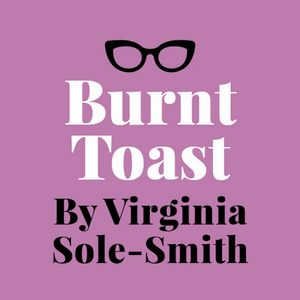
Hol dir die kostenlose radio.at App
- Sender und Podcasts favorisieren
- Streamen via Wifi oder Bluetooth
- Unterstützt Carplay & Android Auto
- viele weitere App Funktionen
Hol dir die kostenlose radio.at App
- Sender und Podcasts favorisieren
- Streamen via Wifi oder Bluetooth
- Unterstützt Carplay & Android Auto
- viele weitere App Funktionen


The Burnt Toast Podcast
Code scannen,
App laden,
loshören.
App laden,
loshören.











